FOREIGN INVESTORS COUNCIL GUIDE 2025/26.

Economic Pulse Indicators and Perspectives


FOREIGN INVESTORS COUNCIL GUIDE 2025/26.

Economic Pulse Indicators and Perspectives








Economic results in 2025 raise pressing questions about the structure and sustainability of Serbia’s current growth model. On the following pages you will find a series of proposals and solutions – both long-term and short-term – aimed at strengthening the country’s investment climate and economic resilience
Year after year, the business environment has become increasingly demanding, shaped not only by global turbulence spilling over into local markets, but also by the structural weaknesses of the domestic economy itself. Macroeconomic indicators illustrate this clearly: in the first eight months of 2025, Serbia recorded weaker-thanexpected growth. The official forecast, initially set at 4.2 per cent, was revised down to 3 per cent in June and further lowered to 2.75 per cent by August. Independent analyses by the Vienna Institute for International Economic Studies and FREN suggest even this figure may be overly optimistic, placing real growth between 2 and 2.5 per cent, with clear downside risks by year’s end.
The slowdown is most evident in investment, which declined by around 2.5 per cent in the first half of the year, particularly in construction, which has registered negative growth for four consecutive quarters. Although major infrastructure projects such as EXPO 2027 are expected to provide momentum, their impact has yet to materialise. Industrial output has also shown only modest gains, while real growth in government spending (3.8 per cent) outpaced private consumption (3 per cent), underlining the structural weaknesses of a growth model heavily reliant on the public sector.
Foreign direct investment – long the main driver of Serbia’s economy – has also been hit hard. In the first half of the year, inflows amounted to just €1.5 billion, a 40 per cent drop compared to the same period last year. Global headwinds, from EU economic growth slowdown and geopolitical uncertainty to trade tensions and the high cost of capital, are the main culprits. Yet Serbia’s heavy reliance on foreign capital, without parallel strengthening of domestic enterprises and innovation, is also proving costly.
At the same time, inflation and the national currency remain stable – a value much appreciated by those operating primarily in the domestic mar ket. Whether this stability can be maintained will depend on the ability to balance external pressures such as rising energy costs with internal spending obligations, including higher public sector wages, pensions and the expected increase in the minimum w age, all of which threaten to widen the budget deficit.
Small economies often suffer disproportionately when global conditions deteriorate. Serbia is no exception, and long-standing internal weaknesses –low productivity, an insufficiently competitive labour market and legal uncertainty – are now taking their toll.
Macroeconomic stability alone will not suffice without stronger legal certainty, regulatory predictability and support for the development of a competitive domestic economy
The answer remains the same: structural reforms and a better investment climate. The White Book provides numerous suggestions for advancing reforms and creating a more predictable business environment. Global challenges are serious, but it is the domestic response that separates successful economies from those that stagnate. A new growth model, one that builds on technological capacity, innovation and resilience, is needed – but it has yet to be fully articulated. Stronger support for SMEs, modernisation of education and the judiciary, and genuine market competition must remain priorities for the years ahead.
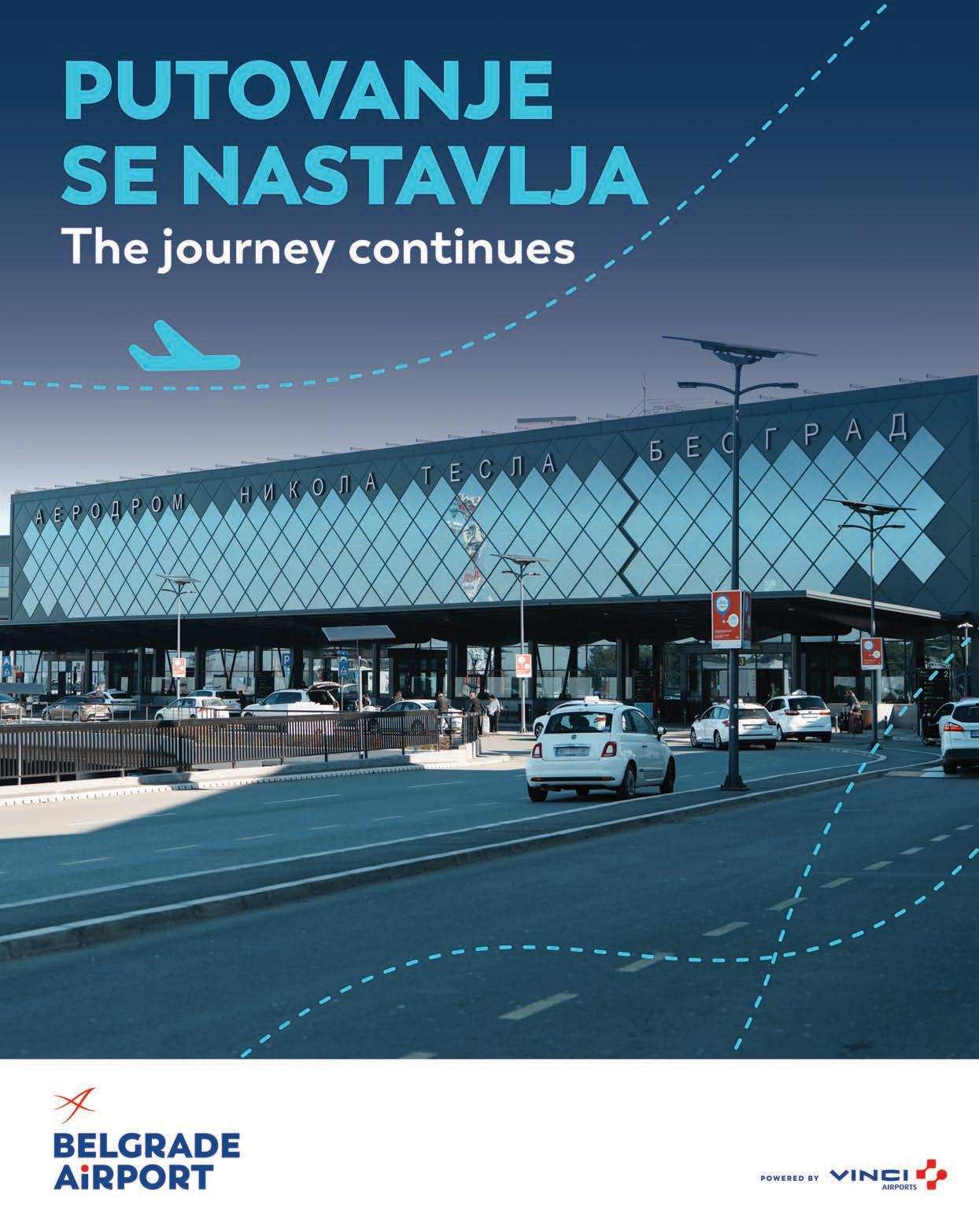






EDITOR IN CHIEF
Tanja Jakobi


EDITORIAL MANAGER
Neda Lukić n.lukic@aim.rs
DESIGN
Slađan Radosavljeć
Zoran Perović design@aim.rs
PHOTOS
Zoran Petrović
COPY EDITOR
Mark Pullen
PROJECT MANAGERS
Biljana Dević b.devic@aim.rs
Mihailo Čučković m.cuckovic@aim.rs
Vesna Vukajlović v.vukajlovic@aim.rs
OFFICE MANAGER
Svetlana Petrović s.petrovic@aim.rs
SPECIAL THANKS TO Aleksandar Ljubić FIC Executive Director
Renata Pindžo FIC Communications Director
Koviljka Nikolić FIC Office Manager
Tamara Kapor FIC Regulatory Officer
FINANCE finance@aim.rs
DIRECTOR
Ana Novčić a.novcic@aim.rs
PUBLISHER
Ivan Novčić i.novcic@aim.rs
PRINTING
Rotografika d.o.o. Segedinski put 72, Subotica FIC 2025/26
Published by: alliance international media Resavska 1/III, 11111 Belgrade 17, PAK 126909, Serbia
Phone: +(381 11) 2450 508 E-mail: office@aim.rs; office@cordmagazine.com www.aim.rs; www.cordmagazine.com
ISSN: 2560-4465
All rights reserved alliance international media 2025
The views expressed in this publication are those of the presenter; they do not necessary reflect the view of publications published by alliance international media
THIS PUBLICATION IS FREE OF CHARGE
COMMENT
How to Respond to Slowing Growth and Investment? / 04
RONALD SEELIGER FIC PRESIDENT (HEMOFARM)
Roadmap to Stronger Investor Confidence / 08
DUBRAVKA ĐEDOVIĆ
HANDANOVIĆ
MINISTER OF MINING AND ENERGY IN THE GOVERNMENT OF SERBIA We Approach Every Aspect of Reform with Responsibility / 12
SRĐAN KONDIĆ
CEO, ADDIKO BANK SERBIA Banking
Transformation in Serbia – Measured in Hours, Not Weeks / 15
JORGOVANKA TABAKOVIĆ
GOVERNOR OF THE NATIONAL BANK OF SERBIA Domestic Demand and Investment as Pillars of Growth / 16
DRAGANA MARKOVIĆ
DIRECTOR OF THE SERBIAN TAX ADMINISTRATION The Will to Embrace Reform as the Key to Long-Term Success / 20
JUDIT ALBERS
CEO A1 SERBIA Vision for sustainable and smart digital growth / 23
SUZANA DUBAJIĆ
MANAGING DIRECTOR, KÄRCHER SERBIA Innovations that Deliver Sustainability / 24
NICOLA PONTARA COUNTRY MANAGER FOR SERBIA, WORLD BANK Unused potentials / 26

NEMANJA TOMIĆ
MEMBER OF THE EXECUTIVE BOARD, PROCREDIT BANK Sustainable Growth and Partnership with the Business as a Mission / 29
DAMIEN SORRELL
EIB HEAD OF THE REGIONAL HUB FOR THE WESTERN BALKANS Results Through Commitment and Resolve / 30
BORKO RISTIĆ
MANAGING DIRECTOR, DATALAB SR A Bridge Between Tradition and the Future / 33
RYAN BOLLHORN
HEAD OF MARKETING AND COMMUNICATIONS AT ISB Excellence Shaped by People / 34

MATTEO COLANGELI
EBRD DIRECTOR FOR WESTERN BALKANS Partnership for Progress / 36
LEV RATNOVSKI
IMF RESIDENT REPRESENTATIVE FOR THE REPUBLIC OF SERBIA
Turning Sound Management into Lasting Growth / 40
ANA GOVEDARICA
VICE PRESIDENT OF THE FOREIGN INVESTORS COUNCIL (ROCHE) The Imperative for Faster Reforms / 44
GORAN PEKEZ
VICE PRESIDENT OF THE FOREIGN INVESTORS COUNCIL (JTI ADRIATICA) Turning Challenges into Opportunities / 46
ALEKSANDAR LJUBIĆ
EXECUTIVE DIRECTOR OF THE FOREIGN INVESTORS COUNCIL FIC Remains a Partner for Reform / 48
DRAGANA STIKIĆ
CO-PRESIDENT OF THE FIC ANTI-ILLICIT TRADE & FOOD COMMITTEE (NESTLÉ ADRIATIC S D.O.O.)
Business Demands Faster Solutions / 50
DRAGAN PENEZIĆ
CO-PRESIDENT OF THE ANTI-ILLICIT TRADE & FOOD COMMITTEE OF THE FOREIGN INVESTORS COUNCIL (BRITISH AMERICAN TOBACCO VRANJE AD VRANJE)
Visible progress, but continuous advancement needed / 51
DANIEL ŠUŠNJAR
PRESIDENT OF THE TELECOMMUNICATIONS AND DIGITAL ECONOMY COMMITTEE OF THE FOREIGN INVESTORS COUNCIL (YETTEL D.O.O.)
5G Networks as a Foundation for AI Development / 52
MILENA JAKŠIĆ PAPAC
PRESIDENT OF THE HUMAN RESOURCES COMMITTEE OF THE FOREIGN INVESTORS COUNCIL (KARANOVIĆ & PARTNERS O.A.D.)
New Work, Old Rules / 53
DANILO MRVALJEVIĆ
CO-PRESIDENT OF THE FINANCIAL SERVICES COMMITTEE OF THE FOREIGN INVESTORS COUNCIL (BANCA INTESA A.D. BELGRADE)
Managing Risk Wisely / 54
DUŠAN LALIĆ
CO-PRESIDENT OF THE FIC FINANCIAL SERVICES COMMITTEE (GENERALI INSURANCE SRBIJA)
Dialogue Towards a More Inclusive Financial Sector / 55
MARIO KIJANOVIĆ
PRESIDENT OF THE INFRASTRUCTURE AND REAL ESTATE COMMITTE OF THE FOREIGN INVESTORS COUNCIL (SOG LAW FIRM IN COOPERATION WITH KINSTELLAR) Efficient Procedures for Sustainable Growth / 56
NEBOJŠA LUKAČ
PRESIDENT OF THE FIC LEGAL COMMITTEE (INDEPENDENT ATTORNEY-AT-LAW, IN COOPERATION WITH PwC) Advancing ESG Through Dialogue / 57
DANILO MIJUŠKOVIĆ
PRESIDENT OF THE PHARMACEUTICAL INDUSTRY COMMITTEE OF THE FOREIGN INVESTORS COUNCIL (MERCK) Innovative medicines are a profitable investment / 58
VANJA KORAĆ
PRESIDENT OF THE TAX COMMITTEE OF THE FOREIGN INVESTORS COUNCIL (PHILIP MORRIS SERVICES D.O.O. BELGRADE) Tax Incentives for Investors / 59
ZAFIRIS LAMPADARIDIS
PRESIDENT OF THE FIC TOURISM & HOSPITALITY COMMITTEE (HYATT REGENCY BELGRADE) Unlocking Serbia’s Tourism Potential / 60
HUMAN CAPITAL From Constraint to Long-Term Growth Driver / 61
KEY MESSAGES / 62 REGISTER / 68

Every recommendation from the Foreign Investors Council, if adopted, would help Serbia move closer to EU standards, enhance efficiency and, most importantly, strengthen business confidence in uncertain times
Investors generally perceive alignment with the European Union legal framework as a guarantee of stability, fairness and predictability in the business environment. As the Foreign Investors Council has repeatedly emphasised, accelerating EU negotiations to speed up regulatory harmonisation is a key priority for reducing geopolitical and regulatory uncertainties, says Ronald Seeliger, President of the Council and CEO of Hemofarm. Yet achieving this remains far from straightforward.
To what extent is Serbia currently exposed to global instability, and how are these changes affecting both existing foreign investors and those considering entering the market?
— As the question suggests, instability sits at the heart of the global economy in 2025. Recent shocks – from freight disruptions and war-related supply chain breaks to rising global inflation under the new US tariffs policy – have introduced a host of new risks, prompting investors to be more cautious and diligent when evaluating markets.
For Serbia, a country strategically tied to European markets but with legacy links to the East, the answer is inevitably nuanced. Some 60 per cent of Serbia’s trade is with EU countries, while around 39 per cent of FDI originates there. At the same time, Serbia remains heavily dependent on the East for gas, oil and storage assets. This combination leaves the country highly vulnerable to external shocks.
We are already witnessing some of the effects. Following a record year in 2024, FDI inflows slowed during the first months of 2025, reflecting shifting investor appetites.
Nevertheless, Serbia remains an attractive investment destination. The challenge is to create a more stable and predictable business climate to sustain investor confidence.
What measures or improvements could the Government implement to protect the interests of longterm investors and strengthen their confidence in Serbia’s investment climate?
— To protect long-term investors and reinforce confidence, Serbia must ensure a stable and predictable business and investment climate. In late 2024, the Government adopted its Reform Agenda, identifying key areas for improvement.
Serbia must prioritise reform of transport and utilities, ensuring state-owned firms operate commercially and involve private partners to improve efficiency and sustainability
This Reform Agenda sets out measures to enhance the business environment by fostering private sector growth, deepening digitalisation, developing a sustainable fr amework – through green energy investments and supply chain transparency – and, above all, implementing fundamental reforms such as strengthening the rule of law and fighting corruption.
The Government could also establish stronger aftercare programmes to engage more regularly with established investors, resolve issues efficiently and incentivise reinvestment. Together, these improvements would send a clear signal that Serbia is a reliable long-term investment destination, giving existing investors the confidence to expand and encouraging newcomers to enter the market.
To ensure meaningful and timely consultation between the Government and the business community, which mechanisms or improvements would the FIC like to see in place?
— Two-way communication is crucial. The FIC has consistently called for more effective dialogue between the Government and the business community, along with the creation of joint initiatives. We have already taken steps in this direction by establishing a Joint Working Group, though, as noted in the latest White Book, it remains underutilised.
EU harmonisation should begin with foreign exchange, complemented by reforms in taxation, labour, sustainability and the digital economy
Constructive dialogue between government, business and civil society must underpin Serbia’s path to deeper EU integration
There are other areas that need strengthening. The FIC advocates for timely and transparent public presentation of draft laws and regulatory changes, giving businesses sufficient time to review and provide feedback. Beyond these consultations, one of our r ecommendations is to establish permanent platforms or councils where businesses and government can meet regularly to discuss and review the business climate. The Government should also build greater capacity within ministries to engage with stakeholders effectively.
How would you evaluate the Government’s pace and commitment to EU accession, particularly regarding regulatory alignment with European standards?
— The FIC White Book 2024 notes that although some progress has been made, the overall reform momentum remains slow. According to the FIC Index
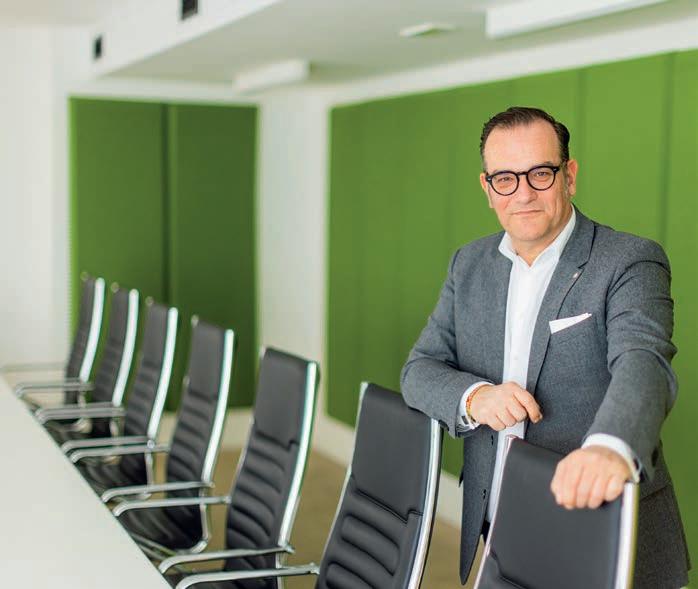
– which overlaps closely with EU requirements – only 23 per cent of priority business climate areas recorded progress in the past year, while 73 per cent saw no improvement. Little has changed since.
Faster alignment of domestic regulations with EU standards not only satisfies EU benchmarks but also reduces geopolitical and regulatory risks for investors. Demonstrating visible, consistent progress would signal stronger commitment and positively influence Serbia’s EU accession process. This is vital not only for meeting EU requirements but also for building a more attractive investment environment and boosting confidence among both investors and citizens.
To what extent can the accepted recommendations from the FIC’s White Book advance Serbia’s path to EU accession, particularly in developing a fully functioning market economy?
— Many – if not all – of the White Book’s recommendations directly or indirectly support Serbia’s EU accession by fostering a more competitive, marketoriented economy, which the EU explicitly requires of candidates.
In practice, recommendations can significantly advance Serbia’s EU path, provided they are implemented. Our calls for reforms in the rule of law, transparency and governance directly align with EU accession Chapters 23 and 24. Our proposals on competition policy, state
aid regulation and public administration efficiency also align, albeit indirectly, with EU requirements for a functioning market economy.
What are the most urgent reforms needed in public infrastructure companies, and how does progress in this area impact the overall investment climate?
— Public infrastructure companies in Serbia – particularly in energy, transport, utilities and telecoms – are often perceived as bottlenecks to private sector investment. Their reform is therefore an urgent pr iority.
Recent developments demonstrate how reforms can strengthen the overall investment climate. The restructuring of EPS management, alignment with the EU’s Third Energy Package and de facto liberalisation of the electricity market have all had a major positive impact. Reliable power infrastructure and professional management structures instil confidence that Serbia can deliver tough reforms. Now it is time to extend reform to transport and utilities.
Which specific regulations or sectors should be prioritised for harmonisation with the EU legal framework to reduce investment risk?
— The most urgent harmonisation should begin with foreign exchange operations, given their direct impact on cross-border investments and financing. But this must go hand-in-hand with reforms in taxation, labour law, sustainability and the digital economy.
Foreign exchange and financial sector rules must be predictable and liberalised so investors do not face risks
The more decisively and efficiently Serbia implements the FIC’s recommendations, the faster it will progress towards EU accession
with currency transfers or conversions. Better labour laws would clarify employer obligations and ease the hiring of both local and foreign talent. Stricter pollution controls, waste management rules and climate action would reassure international businesses that environmental risks are being managed in line with higher standards.
There are also important sectoral priorities. As the CEO of a pharmaceutical company, I must add that our industry benefits greatly from adopting EU standards on drug regulation and approvals, ensuring a stable regulatory environment.

Mining and energy represent one of the most complex, yet also one of the most important sectors for the country’s development. We believe that the measures we are implementing today – both within the sector itself and through the process of EU integration – are creating a strong foundation for strengthening Serbia’s overall economic potential
Mining and energy are the cornerstones of modern development, says Dubravka Đedović Handanović, Minister of Mining and Energy in the Government of Serbia. In her view, Serbia has all the prerequisites not only to achieve energy stability, but also to be recognised as a reliable European partner in the field of clean energy and critical raw materials.
The energy sector is witnessing some of the most profound reforms, while also facing some of the most persistent challenges. Looking back at 2025, how far has the reform process advanced? — Reform of the energy sector is essential, yet demanding and long-term. We launched this process two years ago. The transformation plan of “Elektroprivreda Srbije” (EPS) has been primarily aimed at ensuring significantly improved business results across all areas of operation through organisational improvements in the coming period. These results will confirm that EPS has both the potential and the capacity to compete with European energy companies.
EPS is undergoing substantial change, not only in terms of organisational structure, but above all on the operational level, through more efficient processes and greater overall effectiveness. The departments of information and communication technologies, investments and human resources have been completely reorganised, while a Risk Management Policy has been adopted at the level of the entire system. A draft of the Strategic Corporate Sustainability Framework has been completed, and the Action Plan for Decarbonisation – a prerequisite for further transition – is now in its final stage. For the third consecutive year, EPS has recorded a positive financial result, while simultaneously ensuring energy stability and continuing to invest, particularly in renewable energy projects.

What will the practical integration with the EU energy market mean for citizens and the economy?
— In practical terms, Serbia will become an integral part of the EU energy market, which will enable easier energy exchange, thereby increasing the security of supply. Priority will be given to the cheapest energy available at any given time, which will have a favourable impact on consumer prices.
We were the first in the region to meet the conditions for coupling with the EU market and expect to be among the first to implement electricity market coupling with the EU, specifically with Hungary, thus setting an example for others in the region.
Serbia is recording growth in wind and solar energy production. How significant is this in the overall process of our energy transition and decarbonisation?
— Considering that Serbia and the wider region entered the energy transition later than more developed European countries, and without the financial suppor t available to EU member states, the progress achieved in such a short time is even more visible and significant. Over the past two years, wind and solar capacity has increased by 83 per cent, bringing us closer to the strategic target defined in the Integrated Energy and Climate Plan – to produce 45 per cent of electricity from renewable sources by 2030.
The cumulative outcome of two rounds of auctions is 19 new green power plants, with a total capacity of around 1.3 GW and investments worth almost two billion euros, demonstrating that we have created a favourable investment environment for the energy sector.
We have also significantly accelerated EPS investments, and already this year the company’s green por tfolio will be enriched with 76 MW of wind and solar capacity. Greater progress will be achieved over the coming years, with the implementation of the 1 GW solar power project, including 200 MW of battery storage, which will form part of EPS’s portfolio. As the growth in renewable energy requires sufficient balancing capacity, we have identified the construction of the Bistrica pumped-storage hydropower plant (with a capacity of around 650 MW) as a strategic priority. Our goal is to complete the technical documentation by the end of this year, so that preparatory works can begin next year.
By lifting the moratorium on the construction of nuclear power plants, we have also opened up another potential source of base-load energy for the future.
A recent OECD study for the region has shown that Serbia has relatively ample economic scope

Electricity market coupling is an important objective in the context of European integration, but also from the perspective of benefits to citizens and the economy
The development of energy infrastructure is placing Serbia on Europe’s energy map, providing flexibility, crisis resilience and EU market connectivity, even before formal membership
For the third consecutive year, EPS has recorded positive financial results, while ensuring energy stability and continuing to invest, particularly in renewable energy sources
both to increase electricity prices and further liberalise the market, while also improving the redistribution of existing support instruments to vulnerable and energy-poor households. What are your views on pricing and social policy in the energy sector?
— Electricity and gas prices in Serbia have long been treated as a social category. It is necessary to strike a balance between ensuring that energy companies have sufficient funds for regular maintenance and investments, while at the same time safeguarding living standards, maintaining the competitiveness of the economy and keeping inflation under control. I believe that, despite price increases, we have succeeded in recent years in finding the right balance between these two objectives. The fact that Serbia still has among the lowest electricity prices in Europe is testament to that.
In this respect, changes to the tariff system will not increase bills for low-consumption households – which make up the majority – but will encourage those in the red tariff zone either to reduce their consumption or to increase their energy efficiency. On the other hand, over the past four years, the state has helped more than 35,000 households reduce consumption, subsidising the replacement of doors and windows, improving façade insulation, installing solar panels and replacing boilers with more efficient ones. We will continue with these measures this year and in the years ahead.
When it comes to the economy, the new methodology has enabled every company to sign contracts in line with its consumption profile, to plan and optimise its consumption more effectively against market prices and to use energy more efficiently.
Many issues within the remit of your Ministry –whether in energy or mining – today also carry a security dimension, from critical raw materials to building alternative supply routes. How is Serbia addressing these challenges and how successful has it been in aligning with European policies in this field?
— Energy has always been geopolitically charged. Behind most conflicts in the world today, one can identify struggles for energy resources, for the control of vital transport routes, or for access to mineral raw materials. Serbia is situated at the crossroads of regional energy routes, and the best way to capitalise on this position is through enhanced interconnection with other South-East European countries. As a country with eight borders, we have the opportunity to act as a transit corridor for electricity transmission, while also playing a key role in transporting gas to Central Europe.

The development of energy infrastructure is placing us firmly on Europe’s energy map well before formal EU membership, by increasing flexibility, resilience in times of crisis and the ability to connect to the EU market – which is already under way.
Considering European policies in mining, energy and environmental protection, and our alignment with them, what will be your priorities in the coming period?
— The focus will be on the accelerated development of wind, solar, hydro and biomass capacities, alongside the construction of energy storage systems and enhancing the flexibility of production. At the same time, maintaining energy security and supply stability remains an absolute priority. The transition will be carefully planned and implemented to ensure that reliable and affordable energy is available to both citizens and the economy.
Serbia possesses significant mineral resources that can play an important role in the energy and technological transition. The Strategy for the Management of Mineral and Other Geological Resources until 2040, with projections to 2050, has been prepared and is now undergoing public debate. This Strategy defines
a long-term approach to exploration and exploitation in line with the highest environmental and social standards. Special emphasis is placed on critical and strategic raw materials, which are of relevance to Europe’s new industrial policy. Serbia is following EU guidelines, including the Critical Raw Materials
Alignment with European policies in energy, mining and environmental protection is not merely a formal condition for EU accession, but also a prerequisite for Serbia’s long-term sustainable, resilient and competitive development
Act (CRMA), thereby building a system that supports investment predictability, responsible exploitation and sustainable development.
At the same time, coal remains an important energy source and a component of the production por tfolio that supports the development of renewables, especially during the transitional period.
n banking, as in business generally, it is people who make the difference. Even the best strategy, without the right team, remains nothing more than an idea on paper. Whenever I take responsibility for an organisation, I always begin with three fundamental steps – simple on paper, yet demanding in practice:
1. A clear vision and timeline – you must know where you are heading and when you want to arrive.
2. A team stronger than yourself – colleagues entrusted with key areas must be experts, complementary and closely connected.
The logic of “weaker than me” or “divide and rule” may bring short-term control, but never long-term success.
3. Rapid analysis and process change – in the first weeks I identify the bottlenecks that slow growth and change them immediately, with strict cost control.
The start of every transformation demands intensive communication: I clearly state what is not working, what the goal is, how we will achieve it and what it means for every team member. Everyone has the opportunity to engage. If, after two negative feedbacks, nothing changes – replacement follows.
At the same time, I set measurable goals and tools: I expect directors to deliver key business indicators – growth in volume, revenue and market share – while giving
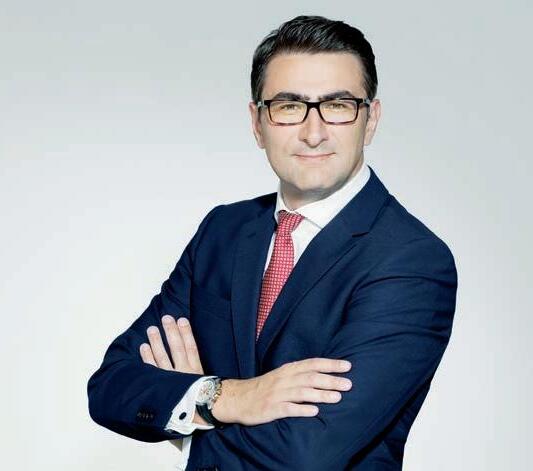
them full freedom to shape their own teams, with the ability to motivate through remuneration well above the market average. The result? Fewer people, but stronger and better motivated – which is immediately reflected in performance.
The role of a leader is not to be the strongest person in the room, but to build a team stronger than themselves. Only in this way can change be swift, measurable and resilient enough to endure even after the leader has gone
Transformations tend to go through similar phases: initial resistance, a quiet phase marked by fear of the unknown after dismissals and new appointments, then the role-model effect of new leaders, rewarding the best among the long-serving staff, celebrating the first results together and finally – team consolidation. Those who do not see themselves in the new environment
leave, while those who do – pull everyone else forward.
My goal is never for a bank to depend solely on me. A true transformation is one that continues even after the leader departs. That was the case with Nova Bank and with Addiko Bank Banja Luka, both of which continued to grow after my departure.
Every transformation also comes with external pressures – competitors react because you are disrupting the market, regulators closely monitor every change, debtors feel stricter collections, suppliers lose contracts, the media ask questions. All this is part of the process. The leader must preserve the vision while simultaneously putting out ten different fires – and emerge stronger from it all.
At Addiko Bank Serbia today we are doing exactly that: removing everything that slows down clients and teams, building a culture of responsibility and high standards, and laying the foundations of a bank that will function just as strongly once I have left.
The role of a leader is not to be the strongest person in the room, but to build a team stronger than themselves. Only in this way can change be swift, measurable and resilient enough to endure even after the leader has gone.
Although the domestic economy is showing resilience and solid growth, global uncertainty requires us to remain cautious, ready to respond swiftly and to adapt in order to preserve stability and maintain continuous economic growth
The IMF’s latest GDP growth forecast for Serbia confirms the resilience of the domestic economy, but we must always be prepared to respond if global uncertainty continues to escalate, says Jorgovanka Tabaković, Governor of the National Bank of Serbia (NBS).
“When we speak of the factors driving growth, we believe that this year and the next, it will be domestic demand, with a positive contribution from both personal consumption and investment linked to the ‘Leap into the Future – Serbia 2027’ programme, whose central component is the international Expo exhibition. In addition, previous investments in the automotive industry and other export-oriented sectors will also contribute to export growth,” Tabaković explains.
A new growth model based on technology and innovation must be built gradually, by strengthening domestic companies while retaining foreign investors to ensure integration into global value chains
She notes that the root causes of the heightened uncertainty witnessed globally since the beginning of this year lie in rising protectionism, the new U.S. administration’s announcement of tougher trade policies, and escalating geopolitical tensions. Such trends greatly impact investor and consumer confidence, as well as overall global economic outlooks, which

in turn complicates the formulation of macroeconomic projections and makes their realisation more unc ertain. “This obliges us to continue exercising great caution in our decision-making, to anticipate challenges, and to respond to them accordingly,” the NBS Governor says.
Do you consider the current growth model to still be appropriate, or are adjustments needed to focus more on innovation, new technologies, and greater involvement of domestic companies?
— First, I would like to emphasise that the growth model Serbia has followed over the past ten or more years has resolved some of the key issues we faced during that period—namely unemployment and the investment gap relative to neighbouring countries. The unemployment rate was reduced from 20.6% in 2014 to 8.6% in 2024. The share of investment in nominal GDP rose from around 16% in 2014 to over 23% in 2024. Total inflows of foreign direct investment between 2014 and 2024 reached €36.7 billion, of which €19.7 billion went into tradable sectors and €10.3 billion into manufacturing, significantly enhancing our export capacity. The importance of these investments is also reflected in the transfer of knowledge and technology, which has helped increase the total factor productivity of our economy.
Should the economy gradually prepare for a new growth model based on new technologies and innovation, with a more prominent role for domestic companies? Absolutely. At the same time, it is important for foreignowned companies that are part of global production chains to remain present in our market, allowing our products to reach international markets and enabling domestic companies to integrate into those supply chains.
Despite the stabilisation of inflation, prices remain high. What are the reasons behind this, and could more have been done to curb the rise in food and raw material prices?
— What affects all of us as consumers most directly is the increase in food prices, which is why such increases often create the impression that overall inflation is higher than official data suggests. Year-on-year food price inflation stood at 7.4% in June, higher than headline inflation, but still significantly lower than in 2022 and 2023, when it exceeded 25%. In June, nearly 100 products and services in the consumer basket were cheaper than a year earlier (including many food items), and the average wage now almost fully covers the average consumer basket, which indicates an improvement in living standards.
Movements in global food and raw material prices were mostly driven by adverse climate conditions and

Despite existing capital liberalisation constraints, Serbia’s foreign exchange regulations do not impede international business – including within the Open Balkan initiative
The NBS aligns its regulations with international standards and supervises the ICT systems of financial institutions to prevent potential cyber incidents
Due to associated risks and volatility, the NBS does not invest foreign exchange reserves in cryptocurrencies, but closely monitors global trends to preserve the safety, liquidity, and profitability of its reserves
other supply-side factors, and there was little that monetary policy could do to prevent those price increases. Mitigating the effects of climate-related factors requires systemic, inter-institutional action—not only within individual countries, but at the international level as well. What matters is to recognise these challenges early and raise awareness among all economic polic ymakers of the need to address them, which is precisely what is now being done within the international Network for Greening the Financial System (NGFS), of which the NBS is a member.
How does the NBS view currency risk and the role of gold or cryptocurrencies in foreign exchange reserves, especially in light of announcements from the U.S. regarding a stronger role for digital assets?
— It is not our practice to comment on the decisions of foreign officials and institutions, but we do analyse and monitor the impact of their decisions so that, if necessary, we can respond appropriately in accordance with domestic regulations and the specificities of our economy, while carrying out our legally mandated tasks and achieving our objectives.
The Law on the NBS does not provide for investment of foreign exchange reserves in digital currencies, and we are currently not considering including them in our reserves. However, we will continue to monitor the effects of such measures on financial markets and manage our reserves in line with the principles of safety, liquidity, and profitability.
As for the concept of cryptocurrencies within foreign exchange reserves, it is important to note that virtual currencies can be highly volatile, are not legal tender, are not backed by central banks, and are subject to speculative influences—all of which are reasons for a more conservative approach.
Digitalisation has made visible progress in Serbia, particularly in the financial sector. How is the NBS strengthening cybersecurity?
— Digitalisation in Serbia has recorded significant progress, especially in the financial sector, where the NBS has played a key role in encouraging innovation and modernising services. Through the development of payment systems, the advancement of electronic banking, and support for fintech initiatives, the NBS has contributed to the creation of a more efficient and accessible financial environment.
However, accelerated digital transformation inevitably brings new challenges in the field of cybersecurity. We approach this issue systematically and responsibly, undertaking a range of activities within our mandate to enhance the security of financial institutions and the protection of their clients.

First and foremost, the NBS continuously improves the regulatory framework in line with international best practice, adapting European and global standards to the specific features of the domestic market. In addition to our regulatory role, we also supervise the management of ICT systems in financial institutions. These institutions are required to report major c yber incidents, and the NBS provides guidance for improving resilience to cyber threats.
In view of regional integration processes, particularly under the Open Balkan initiative, is the NBS considering liberalising the foreign exchange regime within this zone?
— Serbia’s strategic commitment is to achieve full liberalisation of capital flows no later than the date of accession to the EU, through a gradual and selective approach based on macroeconomic indicators, in order to preserve the country’s macroeconomic stability and safeguard the financial system – which is in the interest of all.
Such a strategic approach is especially important given the current economic and geopolitical context and is also aligned with international best practice. In this regard, although certain restrictions still apply in the current phase of capital account liberalisation, the existing foreign exchange regulations do not represent an obstacle to cross-border business operations, including transactions within the Open Balkan initiative. This is clearly demonstrated by the regular conduct of transactions between Serbian residents and non-residents from the region.
The Foreign Investors Council has proposed further streamlining of administrative requirements and a shift to ex-post reporting for cross-border financial loans. Is the NBS considering such measures?
— The ex-post approach effectively reduces every institution to a mere recorder of events, rather than a responsible and preventive actor in the economy and beyond.
We are continually working to simplify reporting procedures for cross-border lending, while ensuring the efficient and timely collection of relevant data. It is worth noting that residents already report the majority of cross-border loans retrospectively.
According to current regulations, prior reporting obligations apply only to financial and subordinated loans and credits – and even then only once, following the signing of the loan agreement and before the first disbursement. All other transactions, including further disbursements and repayment of the principal, interest and fees are reported ex-post, i.e. after the
Mitigating climate risks requires joint action at both national and international levels – and the NBS is already involved through the Network for Greening the Financial System
transaction has taken place, via electronic submission.
This reporting method enables us to obtain reliable and timely data while maintaining compliance with foreign exchange regulations. By monitoring the indebtedness of both tradable and non-tradable sectors, as well as the type of interest rate agreed, the NBS is better positioned to assess foreign exchange and interest rate risks and respond appropriately – thereby contributing to the preservation of financial stability.
For these reasons, we do not consider a complete shift to ex-post reporting of cross-border financial transactions to be justified.

DRAGANA MARKOVIĆ DIRECTOR OF THE SERBIAN TAX ADMINISTRATION
The development of a modern and robust Tax Administration, as we know it today, has relied equally on the processes of digitalisation and automation, as well as the determination of individuals to implement those changes. Without the human factor, such success would not have been possible

The transformation of the Serbian Tax Administration has been recognised as one of the most significant reform processes, not only within the public finance system but also in the broader modernisation of public administration. With the procurement of a new IT system, this process is set to be completed—though the need for continuous improvement of the institution’s operations will remain, explains Dragana Marković, Director of the Tax Administration.
According to Marković, the benefits of reform programmes implemented over the past decade are visible across all areas of the Tax Administration’s work. The planned acquisition of a commercial off-the-shelf
(COTS) software solution is expected to further support the redesigned business processes. “As a result, we will achieve full process automation, improving working conditions for our employees and the experience of our taxpayers. This is yet another indication of the
As a modern and digitalised institution, we will rely on technology and innovation in our fight against the grey economy, one of the most pressing challenges facing Serbia’s economy
Tax Administration’s strong commitment to building a modern and efficient institution,” says Marković.
The long-awaited employment of young and qualified professionals in the Tax Administration has now been announced. How essential are they to your work and to what extent have you been able to address workforce-related challenges through technological upgrades?
— We have declared 2025 the Year of Recruitment. We launched the first recruitment round in January, followed by another in March, and in June we ran a campaign under the slogan: “The Tax Administration is Hiring – Responsible People for a Responsible Society”, reflecting our ambition to attract professionals who can drive meaningful change. We plan to hire 1,000 new colleagues in total, which will help strengthen the Administration while also compensating for the natural attrition of staff due to retirement.
To what extent could the application of new technologies, including artificial intelligence, further enhance the Tax Administration’s efficiency?
— The Serbian Tax Administration has already witnessed the transformative power of new technologies. Our new eFiscalisation system, equipped with advanced risk analysis tools and an analytical platform, has proven highly effective. We now have access to real-time data on all retail transactions across Serbia, allowing us to respond promptly to irregularities. This ultimately contributes to reducing the grey economy and limiting opportunities for misuse, leaving more public funds available for roads, hospitals, schools and kindergartens. Importantly, we did not stop there. In response to increasing demands for digital communication, we developed our virtual tax assistant—a chatbot. This interactive tool provides taxpayers with general information, currently focusing on the Law on Tax Procedure and Administration and the Law on Personal Income Tax. The tool is available to all taxpayers, and we are continually working to expand its functionality.
Looking back on the previous stages of reform, what do you see as the most important steps in developing a modern Tax Administration?
— The most important step was cultivating awareness and a desire for reform, followed by the consistent pursuit of change. One of the most significant operational shifts was the centralisation of functions and the reduction in the number of local branches—from 178 to the current 37. We converted all tax returns and numerous requests into digital form. We take pride in having enabled taxpayers to receive eCer-

Our transformation has delivered measurable financial results, with revenue collection now 180% higher than in 2014, prior to the launch of this process
The Tax Administration plans to recruit 1,000 young professionals, filling posts vacated due to generational turnover within the institution
The Tax Administration invests continuously in staff training and, thanks to European support, is able to provide highquality professional education for its personnel
tificates free of charge since the end of 2019, in continuously improving our eTaxes portal, and in reducing the need for physical visits through the introduction of the eTax mailbox. Later, we adopted the Redesign of Business Processes and a new Human Resource Development Strategy; the new fiscalisation model has been fully implemented, and for three years now, we’ve had pre-filled personal income tax returns. All phases of modernisation will be further supported by the COTS solution. I always emphasise that none of these achievements would have been possible without the dedicated teamwork of all our employees. The human factor remains key to digitalisation—without it, we could not have overcome the challenges of transformation. That is why we continue to invest in education and are part of a Twinning project supported by the European Union to further develop the Tax Administration’s training function.
To what extent has tax compliance improved among businesses and individual taxpayers, and how is this reflected in the level of tax revenue collection?
— We continuously strive to build a partnership with citizens, educating them on their tax obligations and working together to build a responsible society. Through various campaigns, we have raised awareness of the importance of tax compliance, and as part of the fight against the grey economy, the fifth round of the now fully digitalised prize game “Take the Receipt and Win” was launched this May. Tax discipline is undoubtedly at a significantly higher level today than in the past, and we are confident that this is the result of our careful cultivation of relationships with taxpayers and our ongoing improvement of services, which has contributed to public revenue collection.
Despite ambitious deadlines and numerous changes, the transformation of the Tax Administration has gone hand in hand with a consistent and significant increase in revenue collection—one of our core functions. I am proud to highlight that in 2024, public revenue collection reached RSD 2,931.4 billion, representing a 13% increase compared to the previous year, with the positive trend continuing into this year—8% more was collected in the first seven months than in the same period last year. Compared to the same period in 2014, just before the launch of the first Transformation Programme, revenue collection in 2025 marks a 180% increase. In 2025, the Tax Administration accounted for 65% of the total public revenue collected in the Republic of Serbia.

How does the Tax Administration contribute to reducing the grey economy, and what are your key responsibilities under the new strategy for its suppression?
— The Serbian Tax Administration plays a key role in the country’s efforts to consolidate public finances and ensure sustainable sources of public expenditure. We focus our resources on identifying the most complex tax crimes and, between January and June, we uncovered 64 ‘phantom’ and ‘money-laundering’ companies.
The National Programme for the Suppression of the Grey Economy has recognised the importance of continuing the transformation of the Tax Administration, including administrative streamlining and the strengthening of its overall capacities to improve efficiency. The transformation we have undergone has delivered tangible results in combating the grey economy, and we are firmly committed to continuing along that path. As a modern and digitalised institution, we will rely on these very tools in our efforts to address one of the most persistent challenges facing Serbia’s economy.
To what extent do other institutions follow your work and contribute to improving tax discipline?
The mission of the Tax Administration is to collect public revenues, monitor and improve fiscal discipline, and create an environment in which each taxpayer
can fulfil their obligations voluntarily and without unnecessary costs. We do not walk this path alone. The suppor t of the Ministry of Finance is invaluable, as is our cooperation with other public institutions, with which we regularly conduct joint inspection activities and actions to curb the illicit trade of goods and ser vices across all sectors of the economy.
Thanks to the careful cultivation of relationships with taxpayers and the continuous improvement of services, Serbia can now boast of significantly improved tax discipline, which has resulted in stronger public revenue collection
Our cooperation with the National Bank of Serbia, the Administration for the Prevention of Money Laundering, the Market and Tourism Inspectorates, and the Ministry of the Interior is also of great importance. These partnerships are fundamental to the suc cess of our work and contribute to the overall economic wellbeing of our country.
The telecommunications sector is in a new era, shaped by advanced infrastructure, growing user expectations, and an urgent focus on sustainability. In this context, A1 Serbia stands out not just for its market performance, but for its forwardlooking approach to connectivity, ESG, and digital transformation

We spoke with CEO Judit Albers about the company’s next steps and its vision for supporting both users and the economy.
A1 Serbia has achieved significant results in the telecommunications market in recent years. Which initiatives and strategic directions do you see as key for the period ahead?
— We see our role not just as a service provider, but as a long-term partner in Serbia’s digital transformation. Our priorities for the future include the continued rollout of fiber and the rollout of 5G, both of which are crucial for stable, high-quality, and future-proof connectivity. Fixed and mobile convergence remains at the heart of our strategy – giving users seamless experiences at home and on the move. We continue to develop our ICT services to meet the evolving needs of businesses, while keeping simplicity and transparency towards our users - central to everything we do.
Sustainability and green infrastructure are increasingly becoming mandatory standards in business. How is A1 Serbia specifically integrating sustainability/ESG principles into its network and business operations?
— Sustainability is not a separate project – it’s a mindset that shapes our entire business. We are constantly improving energy efficiency and the use of renewable sources,
including 6,470 solar panels at base stations that together produce enough energy to power 750 households per year. This year, we installed 152 solar panels (each with a power output of 700W) on the rooftop of our Data Center in Kragujevac, generating more than 100,000 kWh of green energy annually. This energy is used to power systems within the Data Center, with a CO₂ emission reduction equivalent to planting 63 trees.
Our strongest impact comes through social engagement. Through the #BoljiOnline platform, visited by more than 200,000 us-
Our
priorities for the future include the continued rollout of fiber and the rollout of 5G, both of which are crucial for stable, high-quality, and future-proof connectivity
ers, we promote digital literacy, safety, and responsible technology use. At the same time, A1 Kinoteka helps preserve cultural heritage through digitization. In cooperation with the Yugoslav Film Archive (Jugoslovenska kinoteka), we have digitally restored 40 classics of Serbian and Yugoslav cinema, while nearly 40,000 people have attended our A1 Kinoteka open-air summer cinemas in Belgrade, Kragujevac, and Niš. ESG goals are embedded in every part of our develop-

ment – from digital inclusion to strengthening communities.
The development of 5G, combined with the optical infrastructure, is setting the foundation for future-proof digitalization. How will this technological synergy impact user experience across consumer and business segments?
— More than just speed, 5G enables smarter ways of living, working, and innovating. For consumers, it brings lower latency, better streaming, and more stable connectivity. For businesses, it unlocks opportunities in automation, smart logistics, and advanced digital services. When combined with high-quality optical infrastructure, 5G becomes the key enabler of the digital future. That’s why we’re actively building optical infrastructure across Serbia and have already introduced optical internet and TV services to our offering. In parallel, we’re ready to support 5G from day one. As part of the A1 Group, we bring valuable experience from countries where 5G is already successfully implemented, such as Austria and Slovenia, where Serbian experts were engaged in testing and rollouts. We’re ready to apply that know-how in Serbia as soon as the regulatory framework is in place. Beyond infrastructure, we see ourselves as active partners in Serbia’s digital ecosystem – connecting people, technology, and ideas to support long-term, inclusive growth.
Kärcher is synonymous with cleaning technology and stands among the world’s most recognised brands, having built its leadership position through constant innovation and adapting to customer needs. Today, at a time when efficiency and sustainability are paramount, Kärcher offers smart technology that conserves resources while raising hygiene standards in households and professional environments alike
In this interview with the company’s representative, we reflect on the key drivers of growth, local strategies and the most in-demand products in Serbia.
Which key innovations are currently driving the company’s growth and shaping the brand’s presence in Serbia?
— Our growth today is driven by three main areas: the digitalisation of devices, autonomous cleaning systems, and sustainable solutions focused on reducing water and energy consumption. A good example is our cordless vacuum cleaners with smart sensors that detect dirt and automatically optimise usage. In the professional sector, our Eco!efficiency mode stands out, enabling eff ective cleaning with lower consumption and reduced noise levels.
These innovations are not merely technical upgrades – they are shaping new awareness among customers about achieving excellent results with fewer resources. This approach positions our brand not only as a symbol of strength but also as a responsible partner in sustainable development.
How does Kärcher balance its global strategy with the specific needs of the Serbian market?
— Our business model follows the philosophy of “Think globally, act locally”. Globally, we rely on proven innovations and quality standards, while locally we carefully monitor customer habits and expectations. We

ha ve noticed that customers in Serbia often prefer multifunctional devices that save space, which is why we offer products such as vacuum cleaners with integrated steam-cleaning functions.
We also invest locally in customer education through demonstrations and training, supported by customer service in the Serbian language. As Serbian customers like to experience quality first-hand before
purchasing, we provide them with the opportunity to test our products directly. Trust is fur ther strengthened by local servicing and technical support.
Which products and services currently have the greatest potential in Serbia?
— In the household segment, indoor cleaning devices attract the most attention. Steam cleaners and multifunctional vacuum cleaners are particularly sought after due to rising awareness of hygiene, while highpressure washers are in strong demand thanks to their practicality.
Indoor cleaning devices – such as steam cleaners and multifunctional vacuum cleaners –currently hold the greatest potential in Serbia, in line with rising awareness of household hygiene
In the professional segment, companies are increasingly investing in automated floor scrubbers, particularly in logistics, retail and the food industry. We adapt to the market by offering a complete service package, including sales, training and advice on choosing the most suitable equipment. For more complex systems, we work directly with teams from Germany to provide tailor-made solutions.

There are many opportunities for Serbia to improve its GDP growth rate despite rising global risks, by harnessing internal potentials to drive more resilient and sustainable development
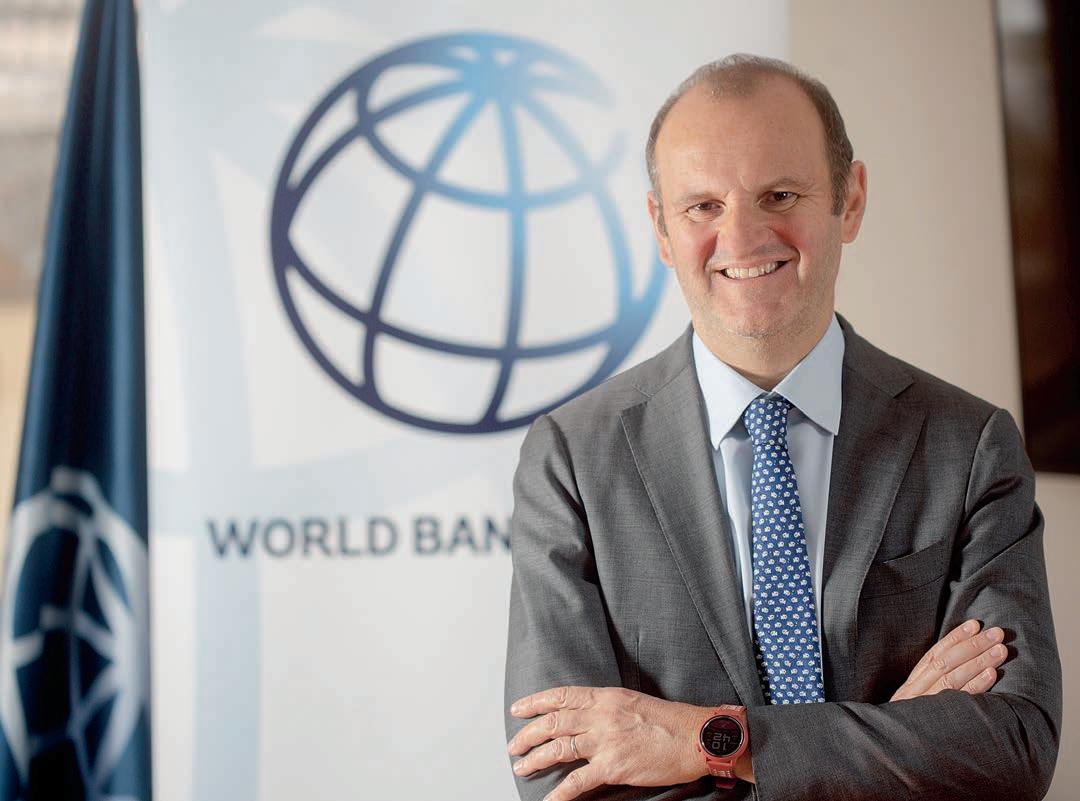
Although Serbia may achieve relatively solid growth this year, the World Bank argues that the country should set its sights on more ambitious targets.
According to Nicola Pontara, Country Manager for Serbia, effective use of the ongoing EU Growth Plan and other initiatives could put Serbia on a faster growth trajectory.
“We regularly monitor economic developments in the country as well as in the EU, which is Serbia’s main
trading partner. In 2025, our preliminary estimates show that Serbia should reach a growth rate of 2.8 percent.
Serbia displays a relatively solid growth outlook, notwithstanding some downside risks. However, we have consistently advised that Serbia has the potential to grow faster – say at as much as 5 or 6 percent a year – compared to its historical average of around 2.5 to 3 percent”, says our interlocutor.
He believes that there is a need for structural reforms which could then underpin faster growth, focusing on implementing ‘second generation’ measures to complete the transition to a full-fledged market economy, bolstering human capital, strengthening institutions and governance frameworks (including through digitalization), accelerating trade with the EU while deepening regional economic integration, and embarking on the green transition. The implementation of this agenda can be facilitated by the ongoing EU Growth Plan and the synergetic coordination of Serbia’s main development partners.
From today’s perspective, how likely and significant are the downside risks to Serbia’s economic outlook, particularly those related to the performance of state-owned enterprises or potential declines in external demand due to global trade uncertainty?
— Downside risks include a failure to overhaul stateowned enterprises (SOE), adverse headwinds originating from the world economy, and growing effects of extreme weather. Besides constituting a drag on productivity growth, large SOEs represent non-trivial contingent liabilities for the state budget: they will need to be modernized or put on a sustainable financial path. Serbia’s new Law on SOEs has introduced the notion of a centralized SOE ownership and management system: this is an important first step that should be followed. Next steps include strengthening corporate governance and ensuring the independence and capacity of SOE boards and managers. As for the world economy: volatility on global markets and heightened uncertainty may penalize Serbia, affecting FDI inflows, or resulting in lower demand for Serbia’s exports. Finally, extreme weather events have had negative impacts on the Serbian economy in recent years. By way of example, the increased frequency of floods and droughts calls for investments in climate-resilient agricultural practices.
In that context, how do you interpret the recent withdrawals of foreign investors from Serbia? Should these developments be read as a sign that past subsidy-driven policies may have attracted lower-quality or less committed investors—or are we witnessing a necessary phase of restructuring Serbia’s FDI profile toward more technologically advanced and sustainable sectors?
— The amount of inward FDI has fallen this year: in the first 6 months of 2025 FDI is 60 percent lower than in the first 6 months of 2024. Several foreign enterprises have closed their businesses in Serbia, mainly in lower value-added sectors, citing rising labor and energy costs. The major investments in

Global market volatility and rising uncertainty could hurt Serbia by reducing FDI inflows and weakening demand for its exports
Serbia could tap EU instruments, climate funds, and regional initiatives to strengthen resilience and attract finance for greener investments through capital market reforms
Large state-owned enterprises not only slow down productivity growth but also pose significant financial risks for the state budget
electric vehicle manufacturing made by Stellantis is a welcome development and will contribute to Serbia’s future export performance and a shift into greener value chains. These developments are part of what we call ‘creative destruction’, with some business expanding and others contracting at any moment in time. The Serbian authorities will need to provide a consistent business environment and ensure that incentives be used only towards supporting investments in sectors that create more value-added – such as IC T and business services, pharmaceuticals and biotech – and have a greater spill-over effect on the rest of the economy.
How well is Serbia progressing in accelerating its energy transition and strengthening regulatory frameworks—and how well it uses World Bank support to advance these goals?
— As we know, Serbia is heavily reliant on fossil fuels. The country has adopted several laws, aligned with the EU acquis, aimed at supporting the green transition and fostering greater use of renewables. Notable progress has been made in successfully implementing the first rounds of renewable energy capacity auctions for wind and solar generation, planning major energy sector infrastructure investments, and initiating early reforms to modernize utilities. Other areas where reforms need to accelerate include modernizing electricity transmission and distribution systems, adopting a carbon pricing model, phasing out coal while ensuring a just transition for affected regions and people, and deploying sustainable financing mechanisms for energy efficiency improvements.
This year has again made the repercussions of climate change unmistakably clear. In your view, is Serbia making effective use of available donor and commercial resources to transition toward a greener and more climate-resilient economy? — Serbia should continue to make policy and investment choices for a more climate-resilient economy but also decarbonize the energy mix. Cleaner energy not only means less air pollution but also improves the country’s competitiveness considering the EU’s impending carbon boarder adjustment mechanism (CBAM). Serbia could actively tap EU instruments, climate funds, and regional donor initiatives to boost resilience and capital market reforms to attract finance for greener investments. At the World Bank, we have helped the authorities introduce green budget tagging, adopt climate criteria for public investment and fiscal management (such as fiscal risk), and amend legal and regulatory frameworks to scale up renewables via competitive auctions.
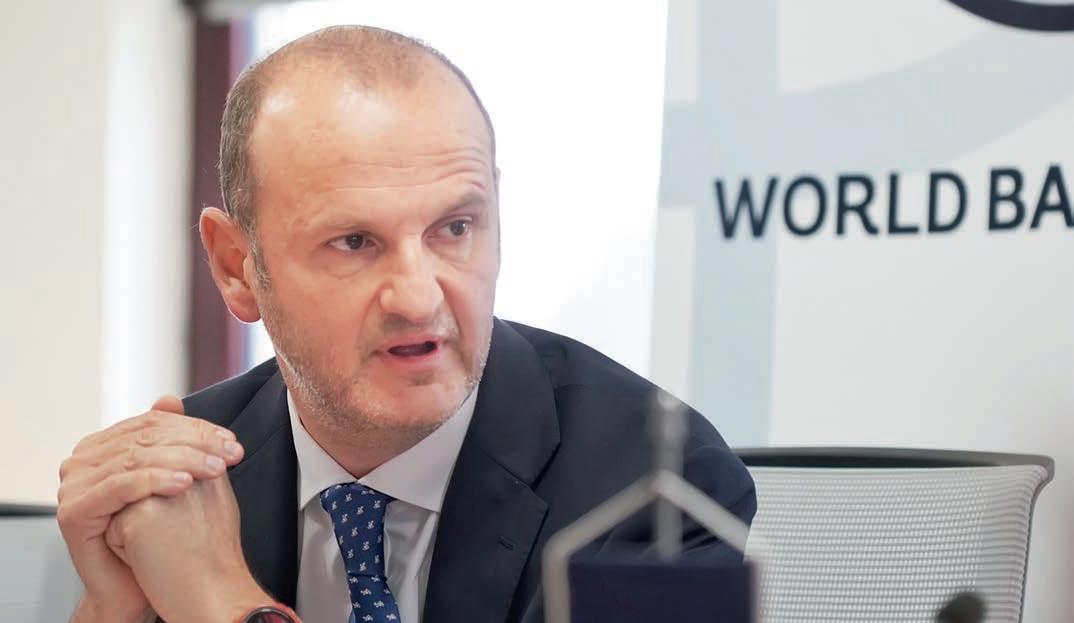
Serbia is currently experiencing a new wave of real estate investments, largely tied to major infrastructure projects and preparations for EXPO 2027. In this context, how does the World Bank’s Second Real Estate Management Project support Serbia in enhancing the transparency, accessibility, and reliability of its real property management systems? What are the most important measurable improvements in land administration, public property use, or investor confidence that you can point to so far?
— The World Bank’s Second Real Estate Management Project has helped the authorities to fundamentally transform the way in which property data is managed in Serbia. By improving data quality and linking up key national registries—like the address, building, and sales price registries—property information is becoming much more transparent and accessible. People and businesses can now easily access a whole host of integrated services, such as registering transactions, through a modern cadastre system. The project also includes the rollout of a mass property valuation for residential properties across Serbia, the upgrading of geospatial databases and further support to strengthen the Republic Geodetic Authority’s capacity and sustainability. Citizens and businesses have saved millions of hours by the implementation of these digitized processes and the electronic interface of institutions like notaries, courts, tax offices, and banks.
While some low value-added sectors are contracting, the Serbian government should create conditions for investment in greener, higher value-added industries.
Beyond current programmes, which areas of intervention does the World Bank see as most meaningful for supporting Serbia in accelerating its EU accession process?
— A thorough implementation of the reforms adopted in the context of the EU Growth Plan could be a game changer for Serbia (and other Western Balkan countries) and reignite convergence with the standards of living with the EU. Indeed, the EU has been a formidable ‘convergence machine’: since 1990, 13 of the 31 countries in the world that managed to transition to high-income economies did so in the EU. In recent years, we have been supporting the Serbian authorities on important topics for EU accession such as trade and transport facilitation, financial programs like the Single Euro Payment Area (SEPA), and energy sector reforms. We stand ready to continue to support Serbia’s reform efforts in key sectors of the economy and its aspiration to join the EU in synergy with all development partners.
A Reliable Partner to Enterprises – from Financing and Advisory Services to Driving the Green Transition and Innovation
For decades, ProCredit Bank has been recognised as a trusted partner of small and medium-sized enterprises, which form the backbone of the domestic economy. The bank devotes its greatest attention to them, seeing in SMEs not only the key to the development and modernisation of the Serbian economy, but also the potential for implementing innovation and sustainable practices. The bank’s focus is not on short-term profits, but on longterm partnership that enables clients to develop their businesses in a safe and sustainable way.
The SME sector in Serbia holds enormous development potential. Entrepreneurs are increasingly investing in digitalisation, energy-efficient technologies and sustainable business models, recognising that long-term investment brings both economic and social value. The bank is witnessing rising interest in financing green projects – from the installation of solar panels and modernisation of production processes, to optimising resources and reducing environmental impact. ProCredit Bank supports its clients not only financially, but also through advice, with specialised credit lines, education, and an individual approach. Partnership with clients means understanding their specific needs and providing solutions that follow the phases of their growth.
Cooperation with the Foreign Investors Council further strengthens the bank’s efforts. The Council represents the collective voice of companies that bring capital,
knowledge, and best international practices to Serbia, while through its White Book and dialogue with the government it highlights obstacles and proposes solutions. ProCredit Bank plays an active role in these initiatives, convinced that only through the joint efforts of the private and public sectors can a stable, predictable, and competitive market be built. Transparency, predictability and alignment with international standards
The message from ProCredit Bank to investors and businesses is clear – Serbia offers significant opportunities, but success depends on readiness to think long term
are crucial for long-term development and for attracting investments that deliver sustainable value.
In the coming period, the bank will remain focused on supporting SMEs, developing digital services, and improving clients’ financial literacy. Special attention will be devoted to projects that reduce CO₂ emissions, promote more rational use of energy, and ensure alignment with European ESG standards. An informed and educated client is more resilient to market fluctuations and better prepared to make long-term decisions – something especially important in times of rapid transformation.

Serbia’s European integration further encourages these processes. Harmonisation with European standards brings greater security for investors, while also opening opportunities for domestic companies to become part of European value chains. If Serbia continues along this path, it can become a regional leader in attracting investment based on knowledge, innovation and sustainability, rather than on cost advantages alone.
The message from ProCredit Bank to investors and businesses is clear – Serbia offers significant opportunities, but success depends on readiness to think long term. Investments that combine economic growth with care for people and the environment will contribute most to the competitiveness and resilience of the domestic economy. In this process, ProCredit Bank remains a reliable partner, ready to support projects that change the economy and society for the better.
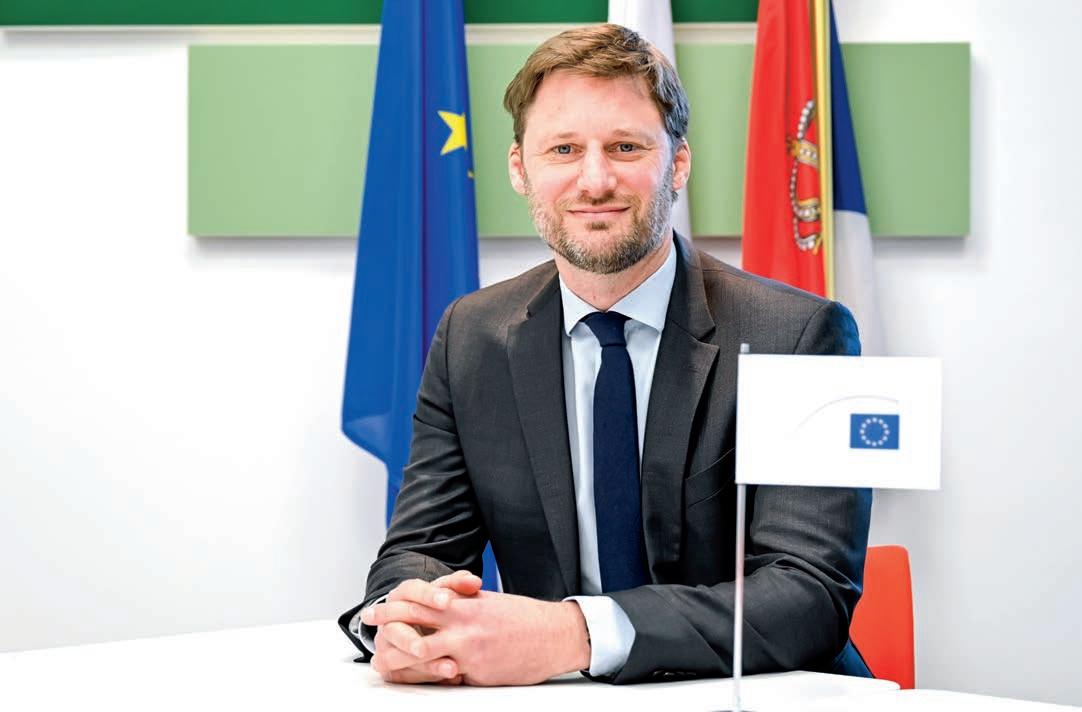
Over more than four decades, the EIB has witnessed Serbia’s steady progress in strengthening its capacity to absorb EU funds. This process has not been swift, but efforts made in recent years have produced tangible results
Over the course of more than 45 years of its presence in Serbia, the European Investment Bank (EIB) has observed the country’s continued progress in strengthening its capacity to absorb EU funds. Since 2015, the EIB has invested €3.4 billion in Serbia, while just in the last two years grants worth €50 million were
signed—underlining both the rise in institutional competence and the growing importance of the Team Europe initiative.
“Serbia has made great strides, but there is still potential to use available funds more efficiently and achieve transformational growth,” says Damien Sorrell, Head of the EIB Regional Hub for the Western Balkans.
What structural or institutional strengths and weaknesses shape Serbia’s ability to deliver real impact with EU and EIB investments?
— Serbia has a relatively strong macro-fiscal framework, stable debt dynamics and a solid track record of c onstructive engagement with international financial institutions. Its institutional alignment with EU policies has improved, particularly in infrastructure, energy and public finance, supported by strategic instruments such as the Single Project Pipeline and the economic governance framework under the EU enlargement process.
However, administrative capacity remains uneven, especially at the local level, often leading to delays in project preparation and implementation. The European Union has also highlighted issues around legal uncertainty, with weaknesses in the rule of law that continue to undermine investor confidence and increase transaction costs. Moreover, state-owned enterprises, particularly in the energy and transport sectors, remain dominant and underreformed, which hampers market efficiency and limits implementation capacity. Deeper governance and administrative reforms are essential to fully translate investments into sustainable impact.
In which area has Serbia shown the most tangible progress in decarbonising its economy, improving connectivity or raising living and business standards? Where is the momentum strongest? — Serbia has made tangible progress in enhancing connectivity, with major infrastructure investments gaining momentum, especially in road and rail networks along pan-European corridors such as Corridor X. Key projects like the upgrade of the Belgrade-Niš railway are advancing steadily. In addition, efforts to improve the inland waterway network along the Danube and Sava rivers, and to rehabilitate roads across the country, are helping to make transport infrastructure more functional, safer and more climate-resilient. These initiatives have received support from the European Union and its bank EIB Global.
On the climate front, Serbia has adopted more ambitious targets and begun investing in renewable energy and the modernisation of its energy infrastructure. EIB Global is supporting this through initiatives to install smart meters, rehabilitate hydropower plants and upgrade the distribution network, to improve energy efficiency and incr ease the share of renewables in the energy mix. As coal continues to dominate Serbia’s energy sector, more work is needed to advance structural decarbonisation.

To avoid stagnation, Serbia needs to improve its investment climate, regulatory predictability, and education system, while aligning its industry with the green and digital transitions
We remain committed to Serbia in the long term and are ready to contribute to the New Growth Plan through investments in key sectors
Under-reformed state-owned enterprises— particularly in energy and transport—continue to play a dominant role, undermining market efficiency and implementation capacity
Improvements in living and business standards tend to emerge more gradually, as they are shaped by a complex interplay of economic and social factors. While Serbia has made good progress over the years, there is clear room for improvement in the informal economy, public services and judiciary capacity, which could promote sustained, inclusive growth.
In the current geopolitical and technological climate, is Serbia doing enough to stay competitive in attracting foreign direct investment?
— S erbia has kept a competitive edge in attracting foreign direct investment through low production costs, a strategic geographic location, a stable macro-financial environment, and free trade access to both the European Union and other regional markets. To remain competitive amid rising regional competition and evolving investor priorities, Serbia is working to move up the value chain.
Many earlier-stage, lower-value investments have by now likely reached maturity or the exit phase – a pattern reflected in the rising share of dividends and interest paid abroad, and repatriated profits. Foreign direct investment was at historic highs in 2024, but it began to slow in early 2025 amid heightened uncertainty. In view of the risk of potential stagnation in reinvestment and diversification, Serbia would greatly benefit from a better investment climate, regulatory predictability, a reformed education system, and an industrial policy aligned with the green and digital transitions.
What message should Serbia send to global investors to attract innovation-driven, high-value foreign direct investment, especially in sectors tied to the green and digital transitions?
— Serbia is on the path to EU accession, positioning itself as a reliable partner by demonstrating incr easing regulatory alignment, leveraging a skilled and cost-effective workforce, and pursuing its ambition to become a hub for innovation-driven investments in the Western Balkans. Ensuring regulatory predictability and strengthening the rule of law should also remain a priority, as this is essential for fostering a favourable and stable business and investment climate.
The country has already made significant progress in the right direction; for example, by adopting a national AI development strategy that also entails new investments in innovation, enabling infrastructure and education. Serbia is actively cultivating its innovation ecosystem, with centres of excellence and targeted incentives for startups already in place.
How effectively is Serbia using EU and EIB funding to invest in digital infrastructure and human c apital to boost productivity and integrate new technologies? Has this had any measurable effect on talent retention or brain drain?
— We welcome the range of initiatives Serbia has launched across key sectors, many of which are supported by EIB Global.
In line with Serbia’s national strategies, we are financing a broad portfolio of projects to strengthen human capital. These initiatives span all levels of education and focus on improving conditions for learning, teaching, and research and development. Collectively, they retain talent, build digital skills and increase employability. Through the Connected Schools initiative, for example, more than 730 000 students and 100 000 teachers now have easier access to high-speed internet and better digital learning environments. This initiative promotes equal access to information and equips young people with the skills needed for the digital economy.
These and other investments we support are helping to foster a vibrant innovation ecosystem and reduce the outflow of talent.
What role is the EIB playing in supporting private sector development in Serbia, especially for SMEs and mid-caps? Are financing tools and advisory services reaching the businesses that can drive innovation, export capacity, and job creation?
— The EIB Group continues to play a key role in expanding access to affordable, long-term financing for small and medium-sized enterprises.
Impact assessments conducted by the EIB confirm the effectiveness of this approach: companies that benefited from our financing recorded a 15% increase in employment and a 20% rise in total assets.
On average, every €1 million in EIB loans supports around 15 jobs—demonstrating the socio-economic value of targeted financial investment.
Serbian businesses currently have access to credit lines focused on inclusive employment and green investments, as well as Guarantee for SME Resilience under the EU’s Western Balkans Investment Framework.

Deeper reforms in governance and public administration remain essential to improve the transfer of investment into long-term, sustainable projects
This programme aims to support 15,000 companies across the region and safeguard 140,000 jobs by mobilising €885 million through new credit lines. We also plan to launch the Innovation and Green Transformation Facility, worth €187 million, designed to accelerate technological progress and promote sustainable investment among businesses in the region.
Through additional investments in Serbia, Datalab is strengthening the development of digital business and offering greater support to small and medium-sized enterprises. PANTHEON ERP provides accessible and professional tools that enhance company competitiveness and open the way to regional cooperation. Particular emphasis is also placed on educating young professionals and creating IT talent that remains in the country
By expanding its capacities in Serbia, Datalab confirms its strategic commitment to the digital transformation of the local economy. Its ERP system connects traditional business practices with a future based on artificial intelligence and automation, while at the same time providing SMEs with an opportunity to participate on equal terms in European markets.
PANTHEON ERP is already used across many industries, but with the development of AI and automation, which specific innovations do you plan to introduce and how will they improve operations in certain sectors?
— I should emphasise that we already use the AI “AION Assistant” for first-level support and navigation on help pages, which is an excellent example of how artificial intelligence can ease the workload of teams and reduce users’ time to resolution. The next
wave of innovation in PANTHEON ERP is directed towards deeper integration of AI and automation into core business processes, not only support.
Specifically, this refers to predictive analyses and models that can be applied in various sectors such as manufacturing, logistics, finance and accounting, and human resources. One of the next steps will be the ability to connect context across multiple modules (procurement + finance + sales) in order to assist users in making better business decisions.
Which specific PANTHEON ERP functionalities do you plan to implement in the coming year to help companies adapt more quickly to digital transformation and AI tools?
— Three key functionalities within eServices, which we have been upgrading in the recent period, are:
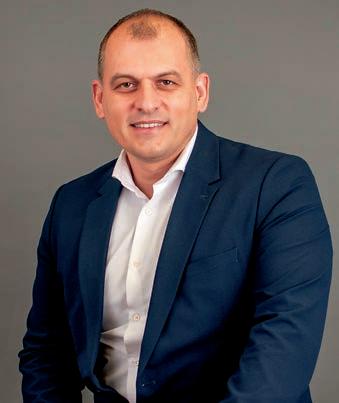
1. Accountless – enables users to access certain functionalities without creating a user account. This allows for simpler interactions with the system, such as quick overviews or access to information without registration.
2. TypeLess – simplifies data entry without the need to precisely define data types. This speeds up processes and reduces the time required to complete forms and documents.
3. Pisarnica (Digital Office) – plays a central role in process automation through efficient document management and internal communication. This functionality allows centralised storage and automatic document handling, integration with other modules, status tracking and productivity gains. All these functionalities contribute to more efficient operations and fewer errors, thereby significantly enhancing overall company productivity.

Improve efficiency, gain control and fulfill your goals.
More than a school, ISB is a collaborative international community of educators, learners and families, guided by empathy, integrity, excellence, respect and responsibility

InBelgrade, where families enjoy a broad choice of schools, the International School of Belgrade (ISB) stands apart. Nestled in the heart of Senjak, ISB is defined not only by its academic programmes, but – most importantly – by the people who make learning exceptional. At the very core of ISB’s philosophy lies a simple conviction: great schools are built by great teachers.
As Serbia’s only international school authorised to deliver all three International Baccalaureate (IB) programmes – PYP, MYP and DP – ISB provides students with a world-class curriculum. What makes this curriculum transformative is the way it comes alive in the hands of ISB’s highly experienced and inspiring faculty. Through inquiry-based learning, tailored support and a genuine passion for lifelong education, teachers encourage students to think critically, act with integrity and embrace the challenges of an increasingly complex world.
This commitment to people is reflected in the school’s priorities. More than 70 per cent of ISB’s annual operating budget is dedicated to staffing. By investing so substantially in its faculty, ISB ensures that every student learns from highly qualified, internationally experienced educators who bring curiosity, expertise and a drive for excellence to every classroom.
ISB teachers represent a broad range of cultural and professional backgrounds, with staff hailing from Argentina, South Africa, Mexico, Canada, Kenya, Spain, France, Poland, the Netherlands and the United States. Their perspectives have been shaped by

years of teaching and learning across the globe, enabling them to connect authentically with students – many of whom are also growing up abroad – while enriching lessons with genuine international insight. Together with their Serbian colleagues, they foster a school community that is firmly rooted in Belgrade yet intrinsically connected to the wider world.
Beyond the classroom, ISB teachers guide outdoor learning trips that build
At ISB, excellence is not defined by programs or facilities, but by the people who bring learning to life
resilience and teamwork, coach students in CEESA sporting competitions across Eastern Europe, and mentor young people in service projects that create meaningful impact both locally and internationally. Under their guidance, students acquire the skills and experiences needed not only for university, but also for life.
What ultimately distinguishes ISB is its people. Facilities and programmes provide the framework, but it is the teachers who bring knowledge to life. More than a school, ISB is a collaborative international community of educators, learners and families, united by empathy, integrity, excellence, respect and responsibility. At its heart are the teachers whose dedication transforms opportunities into meaningful education – a true embodiment of Excellence Shaped by People.

Serbia’s further progress hinges on stronger private investment, better governance of state-owned enterprises, deeper SME integration into global value chains, and an accelerated green transition, all priorities the EBRD firmly supports

Strengthening Serbia’s economic resilience and competitiveness amid global uncertainty is essential, – says Matteo Colangeli, European Bank for Reconstruction and Development (EBRD) Director for the Western Balkans. “There are multiple areas with the potential to deliver substantial productivity and efficiency improvements while reinforcing the country’s resilience.”
In his view, stimulating private sector investments by improving business climate and supporting the growth and integration in international value chains of Serbian SMEs will be crucial. Another important factor in that respect is economic governance, particularly given the significant role that state-owned enterprises continue to play in the economy.
“Another key ingredient will be continuing to invest in Serbia’s promising innovation ecosystem, fostering linkages between the growing and largely export-led IT sector and the real economy in the country. Finally, accelerating the green transition is paramount, including to raise environmental standards in the country and continue diversifying the energy mix towards competitively-priced renewables,” says our interlocutor.
Serbia appears to have made notable strides in accelerating its green transition in recent years. What would you highlight as the most successful aspects of this process so far?
— Serbia has made significant progress in accelerating its green transition in recent years, with several tangible achievements that reflect both commitment and implementation capacity. One of the most successful aspects has been the rollout of renewable energy auctions. We are particularly proud to have supported the Ministry of Mining and Energy in designing and implementing this mechanism, which has proven to be a real success story. Two competitive auctions have been held under the new legal and regulatory framework, attracting strong investor interest and supporting development of over 1 GW of new wind and solar capacity. Importantly, two projects awarded under these auctions are already connected to the grid - a remarkable achievement given the tight timelines, and a strong signal of Serbia’s seriousness about its energy transition.
Keeping in mind the importance of attracting foreign direct investment in higher value-added sectors, how successful has Serbia been in drawing investment into the green transition?
— Serbia made encouraging progress in mobilising foreign investment in its green transition, particularly in the renewable energy sector. The successful implementation of two auctions for wind and solar power

EBRD supported Serbia’s Ministry of Mining and Energy in designing and implementing renewable energy auctions, a key success in the country’s green transition
The Novi Sad solar thermal plant is a flagship project for decarbonising district heating and boosting energy security in Serbia
The EBRD has invested over €1 billion in Serbia’s railways since the 2000s, enhancing connectivity through 13 projects backed by technical and workforce support
capacities, supported by the EBRD, attracted strong interest from international investors and demonstrated the country’s ability to design and deliver transparent competitive processes and, through those, enable bankable projects. These developments have positioned Serbia as a credible destination for renewables investments and created positive momentum in that industry which should be maintained.
Targeted incentives and active promotion of green industrial investments, including through public private partnerships, would help attract FDI into higher value-added activities such as green manufacturing, cleantech, and circular economy solutions.
Furthermore, Serbia should continue working to enhance its climate finance ecosystem. For example, developing green bonds and sustainability-linked financial instruments, building on its existing framework, would open access to a broader pool of institutional investors and build on the positive effects of Serbia’s achieving its first-ever investment-grade credit rating in 2024.
What steps are the most important for Serbia in order to accelerate investments in waste management, wastewater treatment, and air quality? — D espite progress made in recent years, the gap with EU environmental infrastructure standards remains significant. This is a core priority for us, also given the importance this has for quality of life and the attractiveness of Serbian cities as places to live and work. Some examples of EBRD financed projects include the construction of the Makis 2 water treatment plant in Belgrade and the comprehensive upgrade of wastewater and water supply systems in Subotica, including financing a new wastewater treatment plant that helped prevent pollution of Lake Palić. Given the considerable needs in this sector, we are keen to expand our support for wastewater treatment infrastructure nationwide. We have also been at the forefront of strengthening solid waste management, as well as improvement in the air quality.
What key challenges does Serbia face in stateowned enterprise governance and energy efficiency, and which reforms does the EBRD see as most urgent?
— Improving corporate governance and commercialising state-owned enterprises (SOEs) creates multiple benefits, including for the state and society through better public services and reduced budget reliance.
In Serbia, SOE governance has historically faced challenges like unclear objectives and fragmented oversight. The adoption of the 2027 Strategy for State Ownership and the new Law on SOEs - developed with

EBRD support - mark major steps forward. Effective implementation now depends on clear objectives, accountability, and professional, autonomous management. A whole-of-government approach is essential, along with continued support for governance reforms at individual company level which is and will increasingly be a core component of our engagement on financing public investments.
How well has the region used the opportunity to align its rail systems with EU standards, and how would you assess the progress made in Serbia so far in this regard?
— As reported by the Transport Community Secretariat, the EU body in charge of accelerating regulatory convergence, Serbia made good progress in recent years, well above that of other countries in the region, including by unbundling the network from passenger and cargo operators. The freight market is now increasingly competitive, with around 20 private cargo companies operating on the Serbian network and accounting for over a third of the market. Ensuring non-discriminatory access to the network, harmonizing licensing and certifications, and establishing strong independent regulators remain important priorities.
When it comes to infrastructure, the full development of the corridor connecting Budapest with Belgrade, Nis, Skopje, and beyond is the key priority. This is a multi billion euro investment which will require many years to complete.
In your view, what measures are needed to unlock the growth potential of SME sector in Serbia an d make it a stronger driver of the economy, increasing its contribution to GDP?
— SMEs are the backbone of the Serbian economy and their importance is even more important at times of increased uncertainty over FDI flows to the country. I think supporting their further integration in international value chains is critical to raising standards when it comes to productivity and competitiveness. A structured program of incentives to re-invest in innovation and digitalisation could help in that regard. As well as linking state support to foreign direct investors coming to the country to the commitments they are willing to make on nurturing local supply chains.
For us at the EBRD, helping raise SMEs access to finance and skills is a core priority. We channel well over 300 million Euro annually to SMEs through local banks via a number of programs targeting green and digital transitions, as well as companies run by female or young entrepreneurs, and trade finance. On the
The EBRD will keep mobilising donor funds and providing technical support to help Serbia deliver high-impact projects in waste management, wastewater treatment, and air quality
skills front, we work with donors (primarily the EU) to make available the business advice needed for SMEs to grow, in areas including strategic planning, financial management, HR and succession planning, and green and digital transitions.
Serbia should maintain its track record of sound economic management while accelerating reforms to make it easier to do business. This would boost productivity, attract highervalue foreign investors, and encourage more private investment at home

Serbia has managed well so far, but to stay ahead, it needs to do more, – says Lev Ratnovski, IMF Resident Representative. With global uncertainty lingering, he points to the country’s solid macroeconomic record as a strength but cautions that only deeper reforms – from improving the judiciary to addressing inefficiencies in stateowned enterprises – will attract the kind of investment Serbia now needs.
The EU could accelerate Western Balkan integration into supply chains by addressing chronic border delays – a key nontariff trade barrier slowing the region’s convergence with the common market
In light of the global slowdown and growing geoeconomic fragmentation, how does the IMF assess Serbia’s exposure to external shocks, and what policy responses are most critical to strengthen its macroeconomic resilience?
— Serbia’s open economy is exposed to global uncertainty. Notably, a slowdown in the EU would imply weaker exports, FDI, and economic growth in Serbia.
The IMF currently projects 3% growth for Serbia in 2025. This forecast may be revised based on incoming data. We project growth in the 4% range in 2026–2027, driven by infrastructure investment, the rampup of new manufacturing capacities, and tourism revenue associated with Expo 2027.
In the IMF’s view, Serbia’s policy response to the challenging economic environment should be twofold. First, maintaining the excellent track record of disciplined macroeconomic and fiscal policy. Second, reinvigorating reforms to strengthen the business environment. This would help boost productivity, attract higher valueadded FDI, and rekindle domestic private investment.
How should Serbia reposition itself strategically to remain competitive and avoid marginalisation in increasingly fragmented global value chains? What structural reforms or diversification strategies would the IMF consider key to this goal?
— Serbia’s close integration with the EU and its global network of free trade agreements will help the country navigate this period of economic fragmentation. Serbia benefits from an advantageous geographic location, strong human capital, and a diversified industrial base.
Resolving the issue of delays for trucks at border crossings would help Serbia (and other Western Balkans countries) integrate more deeply into European supply chains and the common market.
How does the IMF view increasing domestic criticism that Serbia’s FDIdriven growth model has produced limited developmental spillovers? Do you see a need to rebalance the model toward more inclusive and innovationled growth?
— Much of Serbia’s past growth was linked to attracting FDI based on low labour costs, macroeconomic stabilit y, and a welcoming environment for investors. Thanks to the success of that policy, wages in Serbia have increased, and the country is no longer a lowlabourcost economy.
Now, Serbia needs to refocus on highervalueadded FDI. A better business environment is key to attracting such investment and increasing developmental

Thanks to strong fiscal discipline, Serbia’s public debt has fallen to 45% of GDP, reserves are near record highs, and the country is wellpositioned to weather global uncertainty
Serbia’s energy priorities include SOE costrecovery, efficiency reforms, cleaner energy, and investment in highreturn projects
An ecourt system could enhance commercial justice by digitalising case management, improving access and transparency, and reducing costs – creating a more efficient business environment
spillovers by helping local firms integrate more effectively into FDIdriven supply chains.
Looking ahead, Serbia would benefit from developing innovative and digital sectors of the ec onomy, such as IT, engineering, and advanced manufacturing. This would move the country up the value chains and open new markets. Digital transition requires developing innovative ecosystems, supporting entrepreneurship, and improving mathematical and science education at secondary and tertiary levels.
Judicial efficiency and transparency are widely seen as critical for investment and growth. Have you observed any recent improvements in Serbia’s judiciary that could strengthen investor confidence?
— Serbia needs to strengthen judicial performance in commercial disputes. Not only is case resolution often protracted, but decisions can also vary significantly across similar cases, creating legal uncertainty. An “ecourt” system could meaningfully improve the efficiency of commercial justice. The system can build on the government’s experience in digitalising other areas of public service provision and use existing digital infrastructure. The costs of an ecourt system are usually not high.
Ecourts improve judicial efficiency by digitalising case records, filings, scheduling, and notifications (from and to the courts); strengthen access t o justice through online submissions and video conferencing; deepen judicial transparency and accountability with searchable digital records; and bring cost savings on physical infrastructure and administrative staff.
The introduction of ecourts, alongside continued efforts to train judicial staff and harmonise legal interpretations, would send a strong signal about improving the business environment through more effective administration of justice.
Given the current fiscal trajectory and debt dynamics, how does the IMF assess Serbia’s ability to maintain fiscal discipline while preserving space for countercyclical measures if needed?
— Thanks to a stellar track record of fiscal discipline, Serbia’s public finances are in enviable shape. Public debt stands at 45% of GDP and is declining. Foreign exchange reserves are near record highs. With these buffers, Serbia can successfully weather the ongoing period of global uncertainty.
The IMF’s PCI programme anchors Serbia’s fiscal stance using three rules: a 3.0% of GDP cap on fiscal deficits, a cap on the public wage bill, and a “Swiss
formula” for pension indexation. The fiscal deficit envelope balances Serbia’s infrastructure and social spending needs with keeping debt on a downward path. The public wage and pension rules isolate these sensitive decisions from political pressure.
What further steps does the IMF recommend for strengthening public investment management, and the governance of stateowned enterprises, particularly considering ongoing reforms in the energy sector?
— We see several priorities for Serbia’s energy sector. First, achieving cost recovery in energy SOEs. For example, the planned increase in household electricity tariffs this autumn will mostly be used to strengthen the struggling finances of EPS.
Second, reforming energy SOEs by modernising their management, accelerating costcutting, and improving revenue collection. Higher efficiency in energy SOEs would reduce future tariff increases.
Third, decarbonising, including by moving away from lignitebased electricity generation to cleaner sources of energy. This will also help Serbia adjust to the EU’s soontobeintroduced CBAM.
Finally, Serbia needs to invest in its energy sector. This May, the government adopted the Energy Investment Plan, which outlines the planned projects and their internal rates of return (IRR). Choosing investments with the highest IRR would give the Serbian public the highest value for money.
Given that the government has recently announced its intention to modernise labour market regulations, what are the IMF’s views on key priorities in this area?
—Serbia has made great progress in reducing unemployment over the past decade. But challenges—youth unemployment, low female labour force participation, informality, and the skills mismatch—remain. Tackling these can alleviate shortages in Serbia’s tight labour market and improve competitiveness.
The IMF supports reforms that enhance labour market flexibility. For example, simplifying contract types can encourage formal job creation, especially in SMEs. Introducing more flexible arrangements for parttime work can bring more youth and women into the labour force. Active labour market policies, such as upskilling, reskilling, and digital literacy education, can develop indemand skills.
Labour market reforms are not easy. In the meantime, a first step could be introducing electronic labour documentation, as another signal of Serbia’s commitment to improving the business environment.

Deeper reforms in governance and public administration remain essential to improve the transfer of investment into long-term, sustainable projects

Serbia requires an acceleration of reforms, and the Foreign Investors Council stands ready to support policymakers in that process

The FIC members are prepared to continue investing but believe that Serbia must demonstrate greater consistency and persistence in building a stable market environment, says Ana Govedarica, Vice President of the Foreign Investors Council (FIC). Foreign investors have so far invested more than €45 billion in Serbia and employ over 115,000 people.
“Our message is that we want to continue to invest and grow, but to do so we need security and clear rules of the game. Whether we are speaking about the economy, the environment or healthcare, the common denominator is always the same – stability, transparency and readiness for dialogue before new regulations are adopted,” says Govedarica. “Serbia needs an acceleration of reforms, and the Foreign Investors
Council is prepared to remain a partner in that process.”
She notes that 2025 has been a turbulent year.
“In the economy, where trust is as important as capital, uncertainty slows investment. Serbia has made certain advances in combating the grey economy, but when it comes to real improvements in the business environment in 2025, it is fair to say that expectations were higher than the results delivered,” says the FIC
We expect the introduction of an integrated information system and the full transition of regulatory bodies in healthcare to electronic procedures
Vice President. “The reason lies in the slow pace of reforms and insufficient readiness to regulate what is truly essential – stability and transparency.”
Which priorities in the digitalisation of public services could deliver tangible improvements for companies and citizens – particularly in terms of transparency, efficiency and speed of administration?
— Digitalisation in Serbia has become a frequently discussed topic, but for companies and citizens the crucial issue is that it must bring visible change to daily operations. In the coming period, the priority must be the creation of a single portal through which businesses could fulfil all administrative obligations without the need for parallel visits to different institutions. Security is a particular challenge – with an increasing volume of data passing through state systems, any disruption or leakage could seriously undermine trust. We expect the introduction of an integrated information system and the full transition of regulatory bodies in healthcare to electronic procedures. This is not just a technical matter, but also a question of the speed with which patients gain access to new therapies.
Following the encouraging results in combating the grey economy, which practical measures could further contribute to establishing a level playing field and reducing hidden costs in companies’ daily operations?
— The fight against the grey economy in Serbia has indeed yielded results in recent years, but this is still not sufficient to claim a fair and fully transparent market. The greatest challenge for companies remains hidden costs and unfair competition. The state must take a step further and ensure faster and more consistent enforcement of the law. Equally important is the issue of parafiscal charges – Serbia still lacks a unified register of all levies paid by businesses, which creates room for uncertainty and additional costs.
From your perspective, what more needs to be done for Serbia to get closer to European environmental standards? Where do you see the greatest shor tcomings or potential opportunities?
— Environmental challenges in Serbia remain substantial, even though the state has recently adopted several important strategies. What is missing, however, is their consistent implementation. European standards are not based solely on passing laws, but on ensuring that they applied consistently in every municipality, every city and every factory. The greatest problems are in waste management and air quality control. Serbia still has a large number of illegal landfills, while waste separation and recycling systems operate only

In 2025 we expected a faster pace of reforms and greater stability and transparency, which form the basis for more significant progress and higher investment in Serbia
For patients to gain timely access to therapies, stable and predictable financing of medicines is essential STANDARDS Alignment with European regulations is not only about transposing legislation, but about ensuring that it functions and is applied at every level of government
sporadically. On the other hand, this represents a huge opportunity – investment in green technologies, renewable energy and the circular economy could become a new pillar of economic growth.
What, in your opinion, are the most important steps to ensure predictable and sustainable financing of innovative and generic medicines in Serbia? How can coordination between the Ministry of Health, the Ministry of Finance and the Health Insurance Fund (RFZO) be strengthened to ensure that new therapies are included on the reimbursement list in a timely manner?
— For patients in Serbia to gain timely access to modern therapies, stable and predictable financing is essential. This means that the state must commit to allocating funds for innovative and generic medicines every year, rather than occasionally and on an ad hoc basis. The second element is coordination – the Ministry of Health, the Ministry of Finance and the RFZO must share a joint plan and regularly align their decisions, otherwise the process becomes slow and inefficient. The third element is digitalisation of procedures – the faster the exchange of data and the processing of applications, the shorter the path from regulatory approval to the patient.
Encouragingly, Serbia already has positive experience with healthcare digitalisation, but the pace of implementation remains slower than the needs of patients and the expectations of the industry. It is also necessary to address one of the key issues for the future of the healthcare system – the role of the private sector. Today, private institutions significantly relieve pressure on public healthcare, and it would be beneficial to start integrating the two systems, at least in certain areas.
Deglobalization is changing investment patterns, with companies increasingly valuing resilience and security alongside economic factors. For Serbia, this represents an opportunity to position itself as a stable, technology-oriented and geostrategically significant investment hub

The emergence of the deglobalisation trend is reshaping the way companies plan their investments.
Beyond economic parameters, decision-making processes now place greater emphasis on strengthening resilience to external shocks, diversifying risk, and ensuring strategic security. The most common approaches include returning production closer to key markets (“nearshoring”), spreading risk geographically across multiple smaller locations, and investing in countries that offer regulatory predictability and political stability.
“For Serbia, this is not only a challenge, but also an opportunity to redefine its investment identity,” says Goran Pekez, Vice President of the Foreign Investors Council.
If it is to remain attractive and increase both the volume and diversity of incoming capital, Serbia should act in three strategic directions, our interlocutor notes. First,
Clearly defined procedures, faster digital transformation of public administration and more effective protection of investor rights will help Serbia become more competitive compared to other countries in the region
by promoting its geopolitical position – as a “strategic bridge” providing investors with flexible access to both the EU market and the wider Balkan and Middle East regions; second, by encouraging industrial transformation – channeling investments into high-tech sectors, renewable energy, biopharmaceuticals and digital services in order to diversify capital flows and increase resilience to global shocks; and third, by ensuring institutional security and regulatory predictability to guarantee that the rules of the game will not be changed on an ad hoc basis. “Transparent procedures, accelerated digitalization of administration and stronger protection of investor rights will make Serbia more attractive compared to other countries in the region,” Pekez stresses.
What consequences are foreign investors currently facing due to differences between domestic and European standards, and in which areas would targeted reforms deliver the greatest impact?
— In addition to the constant need to improve transparency in the adoption of regulations, particularly by-laws, what is crucial for both foreign and domestic investors is the consistent enforcement of regulations in practice, as well as accelerating the harmonization of legislation with EU standards. Furthermore, it would be of major importance to resolve border congestion by introducing permanent green corridors for the transport of goods from Serbia to the EU, aligning and strengthening the work of inspection services, simplifying customs procedures by introducing a risk assessment system at border crossings that focuses controls where they are truly needed, while allowing faster passage for companies with proven credibility and a history of compliance. Eliminating parafiscal charges and introducing multi-year tax strategies would provide greater predictability and stability for business operations.
It is also essential to improve the Law on Foreign Exchange Operations, introduce more flexible labour legislation, continue the process of digitalizing public services with electronic data exchange between state institutions and businesses, and intensify efforts to combat illicit trade and the grey economy, among other measures.
You mentioned more flexible labour legislation. In your opinion, what are the most important elements this law should contain in order to better reflect the realities of the modern labour market and provide support to both employees and investors?
— Improving labour legislation has long been in the interests of not only foreign, but also domestic investors, and above all the citizens of Serbia, in order to establish a balance between flexibility and legal security, while creating a predictable and attractive business environment for investors.

Improving labour legislation will strengthen the balance between flexibility and legal certainty, serving the interests of both investors and citizens
To shift towards a high value-added economy, Serbia must focus on R&D incentives, talent attraction and strengthening its domestic knowledge base
To foster innovation and protect human rights, Serbia must adopt a new Law on Information Security and a Law on Artificial Intelligence in line with EU regulations
The current legislative framework does not cover remote and home-based work, which are a consequence not only of the pandemic but also of global labour market trends. In addition, it is necessary to digitalise the administration of employment-related documentation, rationalise the structure and calculation of salaries, specify certain grounds for termination of employment, introduce flexible engagement of pupils and students on internships, and adopt by-laws relating to health and safety at work, among other improvements.
Many Serbian economists argue that Serbia should prioritise foreign investments that contribute to technological modernisation and knowledge transfer. Which public policies could effectively encourage such high-value investments?
— Foreign investments that bring technology and knowledge are key to Serbia’s transition from a labourcost-based economy to one of high added value. Public policies must therefore be directed towards clear and predictable R&D incentives, the digitalisation of administrative procedures, and the creation of a stable fiscal and regulatory framework. It is particularly important to enable the swift entry of highly qualified professionals through talent visa programmes, while at the same time strengthening the domestic knowledge base via university–industry projects. Transparent and well-targeted state aid should reward investment in research, green technologies and innovation, rather than simply the quantity of jobs created. Energy and infrastructure reliability, together with clear rules on intellectual property protection, further build investor confidence.
What steps should Serbia take to strengthen information security in public administration and state-owned enterprises, and how significant is the alignment of national legislation – such as the new Law on Information Security and the forthcoming Law on Artificial Intelligence – with European standards like the NIS2 Directive?
— Although considerable efforts have been made and notable progress achieved in digitalisation over recent years, Serbia must continue to advance the interconnection of state institutions and their automatic document exchange, while also improving electronic communication and document exchange between the public and private sectors – all of which requires a high level of information security. The adoption of a new Law on Information Security is therefore essential, with full alignment to the EU’s NIS2 Directive, as well as a Law on Artificial Intelligence harmonised with the EU AI Act of 2024. The aim is to establish a practice of responsible and transparent use of AI as the foundation for further innovation, while safeguarding human rights and freedoms.
With its new leadership, the FIC remains committed to the principles of expertise, partnership and consistency, but with greater ambition to act as a driver of change, a reliable partner to institutions and the voice of investors calling for predictability, efficiency and equal treatment
In a time of global challenges and uncertainty, the FIC plays an important role as a bridge between the international business community and domestic institutions, says Aleksandar Ljubić, Executive Director of the Foreign Investors Council. The Council’s c ontribution to strengthening Serbia’s economic resilience lies in the timely transfer of information on global investment and business trends, regulatory practice and market needs. Through well-founded recommendations and dialogue with decision-makers, the FIC encourages reforms that make Serbia more competitive and attractive for long-term investment. “At the same time, through initiatives related to digitalisation, human capital development, the green transition and sustainable finance, we actively help align national policies with European and global development priorities,” he notes.
What do you see as the FIC’s most important contribution over the past year in shaping public debate aimed at improving Serbia’s business climate?
— The most important contribution of the FIC in the past year has been maintaining a strong voice for the business community in public – a voice calling for reform continuity, predictability of operations, consistent application of regulations and the rule of law. We actively participated in the work of several working groups and public debates, representing the interests of investors with the aim of creating a more efficient and transparent business environment.
One example was our prompt reaction to the suspension of veterinary-sanitary permits that had already been issued by the Ministry of Agriculture, where we sought a transparent solution that would avoid disruptive changes to the market. Furthermore, through our flagship project, the White Book – which has become a reference document for monitoring regulatory reforms and business community recommendations – we continually highlight regulatory obstacles and propose concrete solutions. Our aim is not criticism, but partner-

ship with institutions – and that, I believe, has been our greatest contribution over the past year.
Given the FIC’s track record in encouraging innovation in financial services – such as e-invoicing, instant payments and electronic identification – what do you see as the next opportunities for public–private cooperation to further modernise Serbia’s financial ecosystem?
— In recent years, the FIC has been a strong advocate of digitalising Serbia’s financial sector. Our contribution to the development of electronic invoicing, instant payments, electronic identification and the introduction of advanced fintech solutions has demonstrated that synergy between regulators and the business community can deliver concrete, measurable results. This experience motivates us to continue with initiatives that modernise the financial ecosystem and make it more efficient, transparent and inclusive.
Looking ahead, we see opportunities in the further development and wider use of e-banking and
To attract a new generation of investors, Serbia must provide a clear legal framework, reliable data and an encouraging business and investment climate. The FIC remains a committed partner in this process
e-commerce. We also consider it vital to focus on public education and to strengthen cyber security regulations, in which all stakeholders should play a role. At the FIC, we are ready.
In a time when global financial flows are rapidly digitalising, it is important that Serbia not only follows trends, but also recognizes strategic opportunities to move ahead.
Given that ESG is shifting from a voluntary commitment to a regulatory and financial imperative, how do you see the Serbian business community adapting to this change, and what role can the Foreign Investors Council play in supporting both compliance and competitiveness across different sectors?
— The transformation of ESG principles from voluntary practice into a regulatory and financial imperative represents one of the most profound changes in the global business environment – and Serbia is no exception. This shift is no longer a matter of reputation, but of access to capital, export markets and sustainable competitiveness.
The business community in Serbia is increasingly aware that ESG is not simply an obligation – it is the new business framework. Moreover, ESG is inseparably linked to the process of European integration, the Green Agenda and integration into global value chains. However, adapting to this framework requires far more than goodwill – it calls for clear standards, sectoral guidelines, accessible data and regulatory predictability. This is precisely where we see the key role of the FIC. Furthermore, the FIC sees its role in supporting institutions by transferring knowledge from countries that have already undergone this transition. We advocate for the gradual, yet mandatory, introduction of the ESG framework – aligned with EU regulation, but flexible with regard to the size and sector of companies. If Serbia wishes to attract a new generation of investors – those who treat ESG as a core value rather than an obligation – it must provide a clear legal framework, reliable data and an encouraging climate. In this, the FIC will continue to be an active and constructive partner.
At the beginning of 2025, the FIC elected new leadership. Looking back at the Council’s development in previous years, which principles would you highlight as key to its effectiveness and influence? And as the Council has grown and become more complex, what new practices or innovations have been introduced to respond to that growth?
— The continuity of the FIC’s influence and relevance rests on three key principles: expertise, partnership and consistency. Over the years it has become clear that success does not come from occasional initiatives, but from persistent and well-argued dialogue, grounded in knowledge and trust. This is why the FIC is not only the voice of investors – but also a reliable and constructive partner to institutions, ready to offer solutions rather than merely point to problems.
As the FIC has grown – in membership, in sectoral diversity and in the complexity of issues addressed – we have had to innovate in the way we work. We introduced more efficient working groups with stronger expert support, enhanced coordination with international bodies, and improved consultation processes within our membership. At the same time, we placed greater emphasis on a systemic approach to public–private dialogue and on cross-sectoral cooperation – since today’s challenges, such as ESG, digitalisation and sustainable growth, transcend sectoral boundaries.
In this new cycle, with new leadership, the FIC remains faithful to these principles – but with even greater ambition to act as a driver of change, a partner in reforms and the voice of investors who do not seek privileges, but demand predictability, efficiency and equal treatment.
An efficient food safety system requires a clearly defined institutional framework, consistent application of procedures, inspector training and supervision based on risk assessment
For Serbia’s food safety and inspection systems to be aligned with European standards, it is essential to implement comprehensive harmonisation of legislation with the EU acquis. This entails adjusting not only the overarching laws, but also by-laws and technical standards that ensure legal certainty and predictability in practice.
It is crucial to define the institutional framework precisely – establishing competences, coordination mechanisms and hierarchy between control bodies, including ministries as regulators, inspection ser vices and accredited laboratories. Without clearly established institutionalisation and regulated accountability, regulations remain ineffective. At the same time, consistent implementation of procedures and continuous training of inspectors are indispensable for equal treatment, legal certainty for businesses and consumer trust.
In parallel, an efficient risk-based supervision system must be established, directing inspection resources towards products, entities and processes posing the greatest potential threats to food safety. Equally important is the digitalisation and integration of information systems, enabling centralised records, real-time data exchange and transparency in the work of supervisory bodies.

and precision farming – in order to contribute not only to the conservation of natural resources, but also to increased production and long-term cost reduction. This requires action in two directions. First, to redefine the system of incentives and subsidies so that it rewards sustainable models, not merely production volume. Second, to develop educational and advisory programmes, since the transition to regenerative methods requires knowledge, technological support and changes in practice. Integration with EU funds and policies – above all the Common Agricultural Policy and the European Green Deal – opens opportunities for financial support and greater competitiveness.
Our committee actively proposes solutions for more effective harmonisation of legislation through working groups. The process is lengthy and complex, yet it shows gradual alignment with the European framework, while the business community nevertheless calls for faster and more systemic solutions
These reforms are not merely a prerequisite for European integration, but the key to building a modern, transparent and sustainable food safety system.
National agricultural policy faces the challenge of reconciling development with EU objectives for sustainable rural development, while also responding to climate change and the demands of market competitiveness. The solution lies in the stronger inclusion of regenerative practices – preserving soil fertility, reducing chemical inputs, crop rotation, agroforestry
Consistent implementation of these reforms could make Serbia an example of how agriculture, ecology and economic development can be integrated into a single strategy for the long-term sustainability of rural communities.
Although visible progress remains modest, there are encouraging signals that the Government is moving in the right direction. A new Food Safety Act and Law on Official Controls are in preparation, intended to bring greater alignment with EU standards and more consistent implementation of procedures. At the same time, a working group on regenerative agriculture has been established, opening the way for the integration of sustainable practices into national policy.
The fact that the grey economy reaches around €15 billion annually clearly shows that combating this problem must remain one of the state’s key priorities
The programme for tackling the grey economy includes systemic public policy measures aimed at achieving three priority goals: (1) strengthening the capacity of inspections and misdemeanour courts, (2) improving tax supervision and reporting procedures, and (3) reducing fiscal and administrative burdens on legal business operations.
One of the elements delivering measurable and visible results is the e-Inspector system, through which 38 inspectorates conducted almost 50,000 inspections during the year. However, six years after its launch, e -Inspector connects inspectorates at the national level, but not at provincial or local levels.
The e-invoicing and e-fiscalisation systems have significantly reduced the scope of the grey economy, to which the introduction of e-excise duties and e-delivery notes will also contribute. The “track and trace” module for monitoring the movement of cigarettes and heated tobacco products throughout the distribution chain will further enhance transparency.

Illicit trade has largely shifted to the insufficiently regulated online sphere. Proper treatment of this area requires closer cooperation and increased capacities of the Ministry of Interior and the Office of the Prosecutor for High-Tech Crime.
Establishing a comprehensive public electronic register and portal for parafiscal charges, as well as enabling electronic payment of all fees and duties, is essential to increasing the transparency of business conditions and discouraging illegal trade activities.
Curbing the grey economy requires a more effective system of penalties for illicit trade, achieved through stronger cooperation between control bodies and courts, specialisation of judges and monitoring the work of misdemeanour courts
Although progress is visible year after year, the pace of implementing certain measures must accelerate, particularly in areas requiring interdepartmental cooperation and consistent enforcement of the law.
The alarming state of Serbia’s inspection services is reflected in an unfavourable age structure and an insufficient number of inspectors. Earlier estimates suggested 3,600 are needed, while currently only 2,200 are employed. Accordingly, securing an adequate number of new inspectors and the necessary equipment must be a top priority.
The reporting system on the results of implementing adopted action plans to control the illicit trade of goods most frequently affected (excise products – tobacco, coffee, base oils, petroleum, alcohol, as well as textiles) has not been finalised in certain sectors, while stakeholders lack data on the outcomes of inspections. Businesses gathered within the FIC will continue to actively contribute to combating illicit trade through proposals to improve the regulatory framework and its full implementation, as well as concrete projects aimed at strengthening institutions and joint campaigns to raise awareness of the negative effects of this phenomenon, which impacts equally the private sector, the state and citizens. The Council’s members fully support and acknowledge the efforts invested by state authorities in fighting the grey economy and will, in the period ahead, remain reliable partners and allies to all relevant institutions in creating a more stable and transparent business environment.
The focus on applying artificial intelligence in healthcare, agriculture, education, biotechnology and cyber security creates new opportunities for the advancement of both the public and private sectors
Serbia’s new Strategy for the Development of Artificial Intelligence for the period 2025–2030 represents a major step forward in positioning the country as a regional leader in digital transformation. It is encouraging that key areas of AI application – healthcare, agriculture, education, biotechnology and cyber security – have been clearly identified, thereby opening concrete opportunities for growth across both the private and public sectors. Also worthy of note is the emphasis placed on technical infrastructure, including the expansion of supercomputer capacities and the National AI Platform, as well as the continued digitalisation of public administration, with the Office for IT and eGovernment making a visible contribution. Education holds a central place in the Strategy, which is crucial for building domestic expertise. However, given the broad range of areas covered, it will be important in the coming years to define clear priorities and focus resources on their implementation.
The introduction of 5G networks constitutes the foundation for a new phase in the development of artificial intelligence. High-speed data transfer, low latency and the capacity to support massive device connectivity will enable real-time AI applications, particularly in areas identified as strategic priorities. The public tender for the allocation of radio frequencies is under way and expected to be completed by year’s end. Following this, mobile operators plan to launch commercial 5G ser vices that will provide users with new quality, while simultaneously relieving existing network traffic. This technological upgrade will strongly boost the accelerated development of AI, IoT solutions and the digital economy as a whole.

For next-generation networks to become a reality, regulatory frameworks in other areas, such as environmental protection, also need to be aligned with EU best practice. The Foreign Investors Council, in cooperation with the Faculty of Electrical Engineering in Belgrade, has successfully conducted a scientific study aimed at providing optimal recommendations for regulations on non-ionising emissions, based on the highest international standards and field measurements of elec tromagnetic radiation.
The Foreign Investors Council, in cooperation with the Faculty of Electrical Engineering in Belgrade, has produced a study recommending the alignment of regulations on non-ionising emissions with international standards, thus laying the foundations for the development of next-generation networks
The Telecommunications and Digital Economy Committee assesses cooperation with the relevant institutions as being extremely positive. The Ministry of Information and Telecommunications and RATEL stand out as strong partners for their open dialogue, efficient exchange of information and readiness to consider the views of the business community. Public consultations are regularly organised during the drafting of regulations, representing an important channel for jointly shaping realistic and sustainable solutions, thereby contributing to predictability and strengthening the regulatory framework.
The Foreign Investors Council stands ready to support the drafting of a new set of labour laws, if the announced amendments move forward, drawing on its knowledge and experience
The regulatory framework relevant to employment has awaited further development for many years. Proposals for its improvement, outlined in the White Book, are numerous and primarily formulated on the basis of the experience of HR Committee members in applying existing regulations. However, the Committee particularly emphasises the need for the adoption of the Law on Internships – although a draft was prepared in 2023 and public consultation completed the same year, the law has still not been enacted.
This law should systematically regulate internships, which are becoming an increasingly attractive form of engaging young talent. Given the benefits for both companies and interns, as well as the need to eliminate current legal gaps that may lead to disputes and abuses, its adoption would significantly enhance legal certainty and the protection of labour market stakeholders. This would be achieved by precisely regulating key issues such as the form and content of internship agreements, the maximum duration of engagement, entitlement to remuneration, as well as health and safety at work.

Social Affairs has announced the launch of the Twinning project “Support to improving working conditions and preparing the Republic of Serbia for participation in EURES.” One of its key objectives is the alignment of labour legislation with EU acquis through drafting a set of laws, including the Labour Law and the already mentioned Law on Internships. The project is expected to unfold in several phases until the end of 2026, and the FIC will offer its knowledge and expertise during the consultation process.
The Committee highlights the need for adoption of the Law on Internships, which would finally regulate this area and increase legal certainty on the labour market
I n addition, the contemporary labour market has for several years been characterised by flexible forms of engagement – such as remote work, hybrid regimes and similar models. However, it seems that current labour regulations still lag, at least partially, behind evolving practice, which may discourage flexibility and slow business processes. It is therefore advisable to consider their further improvement and alignment with modern needs and trends in this field.
With regard to future amendments to the Labour Law, the Ministry of Labour, Employment, Veteran and
The HR Committee has for years highlighted the need to amend and align legislation so that digitalisation can be fully applied to labour law. In this respect, we welcome the further integration of digitalisation in the workplace through the announced introduction of an e-sick leave system, designed to connect employers, doctors and the Republic Health Insurance Fund. It remains to be seen whether the new system, after its pilot phase, will be fully implemented and what effects it will deliver. Employers are particularly focused on its potential impact in preventing sick leave abuse – an issue that does not stem from a lack of control mechanisms, but rather from the way the sick leave is applied in practice, especially at the primary healthcare level and from the court practice that complicates sanctioning abuses.
In response to the global crisis and rising financial risks, the Committee intends, in cooperation with the Government of Serbia and the National Bank of Serbia, to support the development of advanced hedging solutions and instruments to protect market participants
Within the framework of the FIC, the Financial Markets Committee has in recent years initiated some of the key developmental reforms of Serbia’s capital market. The domestic corporate bond market has been significantly enhanced, marking a qualitative leap from the previously low level of issuance and creating entirely new sources of longterm financing for Serbian companies. A modernised regulatory framework for financial derivatives has also been established, providing companies with a palette of functional tools for effective risk management. Numerous procedures have been simplified, easing the operations of financial institutions. Dialogue with the National Bank of Serbia and the Government has been highly constructive and fruitful, and these successful reform efforts have further strengthened investor confidence and the overall liquidity of the domestic market.
In the period ahead, the Committee will focus on managing the challenges of global geopolitical uncertainty, with particular emphasis on the growing importance of advanced hedging solutions to safeguard against financial risks. In an environment of constant and rapidly emerging uncertainty, it is essential to develop more efficient tools for the timely analysis of complex market trends. Such instruments help companies to manage rising geopolitical and economic risks effectively, and cooperation with the Government of Serbia and the National Bank will be further intensified. Existing regulatory frameworks require continuous and agile adaptation to the new economic reality. Further alignment with EU financial standards remains of crucial importance. This is a prerequisite for the full integration of Serbia’s market into the European single space, while the primary
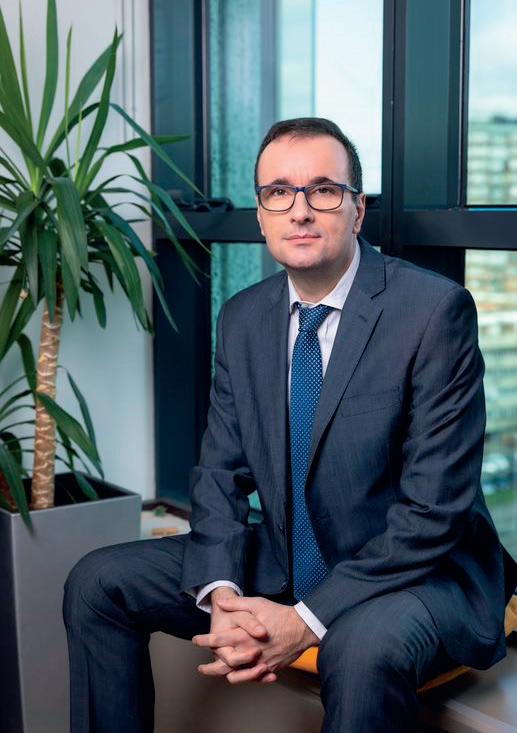
objective remains greater resilience of the financial sector as a whole. A particular focus will be directed towards integrating sustainable (ESG) finance principles, with the development of domestic financial talent serving as a key factor in the sector’s long-term competitiveness.
The Financial Services Committee has initiated key reforms that enhanced the capital market, opened new sources of financing and strengthened investor confidence through regulatory modernisation and successful cooperation with institutions
Digitalisation is fundamentally modernising the provision of financial services and the overall operations of financial institutions. At the same time , it promotes the creation of a more sustainable and responsible corporate profile. The introduction of digital solutions also increases access to financial services for a broader range of users. The accelerated application of artificial intelligence (AI) off ers the potential for unprecedented efficiency. This opens the door to fully personalised services tailored to the needs of each client. However, it also carries significant risks in terms of data security and privacy. The forthcoming Law on Artificial Intelligence, eagerly awaited in Serbia, will need to carefully balance the encouragement of technological innovation on one hand, with the establishment of a robust ethical framework and effective security oversight on the other.
The modernisation of Serbia’s financial system requires further digitalisation and innovation, alignment with EU standards, improved financial literacy among young people and stronger regional integration
In recent years, Serbia’s financial sector has undergone dynamic changes, driven by regulatory improvements and the growing needs of the market. In this context, the efforts of the National Bank of Serbia to enhance transparency and communication with the market represent an important step forward. Particularly significant are the mechanisms ensuring that the public and economic stakeholders are regularly informed about regulatory initiatives, which contributes to stability and trust in the system. The next logical step would be to further strengthen consultation processes with the business community and to institutionalise public debates, in order to ensure that the solutions introduced are not only regulatory in nature but also applicable in practice.
The modernisation of Serbia’s financial system calls for a strategic approach in several directions. Digitalisation and the development of innovative financial products remain priorities, particularly in the field of payment services and electronic identification, where there is scope for improving interoperability and encouraging greater participation by citizens and businesses. At the same time, it is important to continue harmonising the regulatory framework with EU practices, which will enhance security and predictability in the business environment. Strengthening financial literacy, especially among young people, through partnerships between regulators, banks and insurance companies, also represents a key factor in sustainable development. Regional integration initiatives, such as the Open Balkan, open opportunities for stronger economic cooperation. In this context, more flexible adjustments to the foreign exchange regime and simplified crossborder transaction procedures would help create a level playing field and increase market competitive -

ness. Moreover, developing unified standards in the areas of payment systems and insurance could significantly ease the operations of companies active across multiple countries in the region.
The Committee initiated dialogue on digital transformation and fintech supervision, opened the way for market development, and continues to work on aligning Serbia’s financial sector with modern European practices
This year once again saw the successful organisation of the FIC Financial Services Conference under the title “Investments in Focus – Global Trends, Local Responses” (10 June 2025), which brought together key stakeholders from regulatory institutions and the financial industry. The Committee thereby reaffirmed its role as a main partner in dialogue on market development. Over the past year, the Committee initiated dialogue with regulators on the subject of digital transformation and the appropriate supervision of new financial technologies. As a result, space has been created for the further development of Serbia’s fintech market, while maintaining system stability. In the period ahead, the Committee will remain committed to promoting initiatives that support the alignment of the domestic market with best European practices and the creation of a modern, inclusive and competitive financial sector.
Our vision remains clear – Serbia’s financial system must be stable, predictable and innovation-oriented, with a regulatory framework that stimulates economic growth while at the same time safeguarding consumer interests. This is a shared task for all stakeholders, and the FIC will continue to be a reliable par tner in this process.
Frequent amendments to legislation and the adoption of special laws for individual projects may ease the implementation of strategic investments in the short term, but in the long run they undermine the position of other investors and fail to provide solutions for the development of a competitive market
In 2024, Serbia recorded more foreign investments than some Central and Eastern European c ountries, such as Hungary. Although this trend did not continue into 2025, the Serbian real estate market remains attractive to investors. Alongside traditional commercial and residential projects, there is growing interest in hotel facilities, as well as modern buildings for industries using advanced technologies, including data centres and eco-industrial parks.
When discussing the challenges facing investors in construction and real estate in Serbia, it often seems that we are speaking the same business language, but that difficulties arise when it comes to the law and its implementation. Investors are willing to accept market r isks and understand that obtaining permits requires time. What they cannot accept, however, are unclear and unpredictable procedures – for example, not knowing ho w long an administrative procedure will take, which additional documentation a notary public may request, or which objections might be raised to project documentation during the process of obtaining a construction permit.

Frequent changes to legislation and the adoption of lex specialis for individual projects are interventions that fail to address the genuine needs of the business c ommunity. While the intention to enable the realisation of projects of strategic importance for Serbia is understandable, such interventions weaken the long-term position of other investors, who should be the drivers of growth and market diversification. Occasional state support for strategic projects can provide temporary momentum in the construction sector, but only efficient and predictable procedures can serve as the foundation for sustainable growth.
The digitalisation of the cadastre, streamlined procedures for construction permits, and the introduction of e-services for energy permits and environmental impact assessments have proven to be the most successful steps in improving Serbia’s investment climate
The objective should therefore be to align both approaches as closely as possible, ensuring equal attention and legal certainty for all market participants. Rather than focusing on new legislative changes, greater effort should be directed towards strengthening the capacities of authorities responsible for issuing permits, as well as improving their coordination with other holders of public authority, in order to make construction and investment procedures more efficient, predictable and consistent.
The Serbian Government must establish a robust ESG compliance framework and ensure regular updates to legislation based on public input and international standards in order to strengthen investor confidence and attract foreign investment
In recent years, Serbia has made notable progress in aligning its legal framework with European Union standards. This represents a critical step on the country’s path to EU membership, as harmonization of laws is essential for integration. Significant reforms have been undertaken across a range of areas—including competition law, trade and environmental policy—to bring them into line with EU regulations. These reforms aim to foster a competitive market environment, which is vital for attracting foreign investment. Serbia has also advanced in reforming its judicial system to improve efficiency and transparency. Nevertheless, challenges remain. While legislation is being updated, effective implementation and enforcement are still a work in progress. Sustained commitment to reform is necessary to achieve full alignment with EU standards, particularly the integration of Environmental, Social and Governance (ESG) principles into Serbian law. This alignment is not only crucial to meeting EU expectations, but also to ensuring sustainable development.

ing supply chains, non-financial reporting, strategy development and due diligence.
The FIC Legal Committee plays an active role in shaping legal reforms that enhance Serbia’s investment climate, working to streamline regulations and overcome bureaucratic challenges
The FIC Legal Committee plays a proactive role in driving reforms that create a more conducive environment for foreign investment. One of its key initiatives is the advocacy of streamlined regulatory processes. By engaging with both Serbian institutions and international bodies, the Committee seeks to identify and propose solutions to bureaucratic bottlenecks that deter investment.
In May, FIC organized the panel “Insight on ESG –Challenges related to the EU Omnibus Package”, with contributions from Nemanja Tomić (ProCredit Bank), Beata Fridrich (MK Group), and Nebojša Lukač (PwC Serbia and FIC Committee President). The discussion addressed key aspects of ESG implementation, includ-
For ESG standards to be successfully embedded, the legislation must be carefully drafted so to fully address environmental protection, social responsibility and corporate governance. Such a holistic approach will not only foster a sustainable business environment, but will also enhance Serbia’s competitiveness and attractiveness to international investors. Equally, the Government should conduct a thorough review of existing laws to identify areas requiring alignment with EU ESG standards. Engagement with relevant stakeholders can help facilitate smoother transitions.
Capacity building is another crucial element. Investing in training programs for regulators and businesses on ESG compliance and sustainability best practice will support Serbian companies in meeting new legal requirements. Public campaigns to raise awareness about the importance of ESG standards can also secure broader support. Actively involving stakeholders – Including businesses and civil society— in the legislative process will ensure that the regulations are well-grounded in practice.
DANILO MIJUŠKOVIĆ PRESIDENT
The introduction of new medicines must remain a consistent practice, as this is precisely where modern and efficient healthcare begins – providing patients with better treatment outcomes while ensuring the system’s long-term sustainability
In recent years, Serbia has made visible progress in improving the availability of innovative medicines, which are important not only because they enhance treatment outcomes and patients’ quality of life, but also because they often provide therapies for diseases that previously had no available treatment. This trend has been encouraging and has demonstrated the Serbian healthcare system’s readiness to keep pace with the most developed countries. Given patient needs and the dynamic global development of pharmaceutical innovation, we hope this trend will continue and accelerate, since access to innovative medicines in Serbia is still not at the level of EU member states. It is essential to improve the system of evaluation, planning and financing of new therapies, with clearly defined decision-mak ing deadlines and transparent processes, in order to provide patients with timely access to modern medicines.
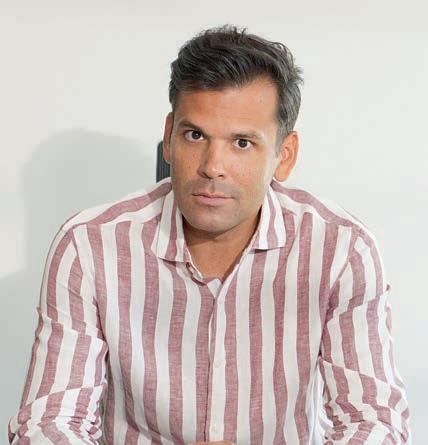
higher-quality processing, more rational resource use and a reduction in unnecessary costs. Data form the basis for long-term decision-making. In this sense, digitalisation ensures better access to information for doctors and policymakers, who – based on accurate and structured data – can plan resources, develop healthcare policies and define priorities in a sustainable manner. Digitalisation is particularly important in areas requiring an individualised approach and efficient coordination, such as rare diseases and in vitro fertilisation programmes. In these areas, digital solutions can contribute to better records, more efficient use of therapeutic options and greater justification of investments.
We are particularly proud of the panel held at the Belgrade Economic Forum, where Committee members, together with representatives of state institutions, demonstrated their readiness to work jointly on improving the healthcare system
The budget for innovative medicines represents a profitable investment, as the timely introduction of advanced therapies reduces healthcare costs while simultaneously improving the quality of care and public health.
Digitalisation of the healthcare system is one of the key preconditions for improving efficiency, transparency and accessibility. Among Serbia’s most significant advancements is the development of the e-medical record, on which the Ministry of Health is actively working. This is a strategically important project that enables patient data integration, providing faster and
Our Committee brings together major innovative and generic pharmaceutical companies, wholesalers and other key healthcare stakeholders. This diversity of membership provides us with a unique insight into the functioning of the healthcare system as a whole.
Such a comprehensive perspective offers added value for strengthening cooperation with state institutions, as we can put forward concrete, well-founded solutions for systemic improvements. We are particularly proud of the panel we organised within the framework of the Belgrade Economic Forum, which brought together eminent Committee members – directors of leading member companies – alongside a representative of state institutions. In doing so, we demonstrated our openness to dialogue and our readiness to work together on improving the healthcare system.
A predictable tax policy, along with timely consultations with the business sector, is imperative for the effective implementation of tax reform and digitalization
The FIC Tax Committee monitors the alignment of Serbia’s tax legislation with EU standards, the implementation of existing laws and their impact on members’ operations. Serbia participates in global initiatives against tax avoidance under the OECD BEPS (Base Erosion and Profit Shifting) framework, including “Country-by-Country Reporting” and the application of the Multilateral I nstrument (MLI) for preventing double taxation. However, Serbia has not yet considered implementing the OECD Pillar 2 initiative on the global minimum tax of 15%, which could affect the competitiveness of tax incentives for foreign investors. The Tax Committee has therefore recommended that the Ministry of Finance communicate its plans regarding this initiative in a timely and transparent manner.
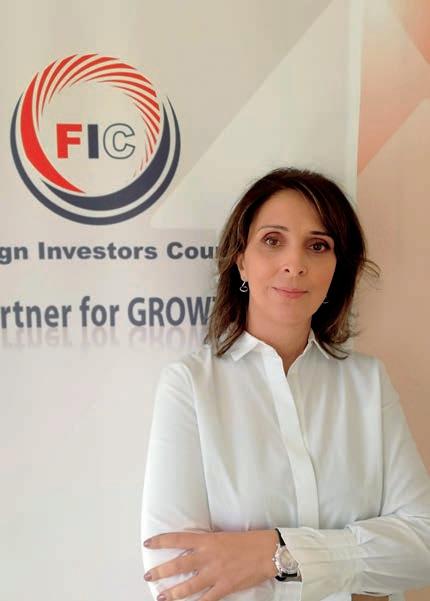
The Tax Committee is preparing a Position Paper with proposals to improve the introduction process of e-excise stamps and e-delivery notes, and expects constructive cooperation with the Ministry of Finance on this matter
In line with EU practice and recommendations, the Tax Administration is implemen ting digitalization of the tax system to increase transparency and efficiency. The e-invoicing system has been introduced and continues to be improved, with the Tax Committee submitting proposals for enhancements, many of which have been adopted. For 2025, the introduction of eexcise stamps and e-delivery notes is planned, but uncertainties remain in the legal framework, particularly with regard to e-delivery notes. The Tax Committee is preparing a Position Paper with specific proposals and member questions, and we look forward to constructive cooperation with the Ministry of Finance.
Alongside indirect taxes (VAT, excise duties and customs), which are being adapted to digitalization needs, further improvements are required in tax policy – particularly regarding personal income tax, property tax and parafiscal charges. These issues have been well known for years, yet systemic solutions are still lacking. Partial measures taken to meet short-term needs have led to shortcomings in both horizontal and vertical tax equity, which are increasingly evident and continue to burden business operations.
Some of the Tax Committee’s key recommendations include ensuring predictable tax policy through consultation with the business community, simplifying and clearly interpreting regulations, reducing fiscal burdens and parafiscal charges through a transparent register, strengthening the capacity and communication of the Tax Administration, and implementing decisive measures against the grey economy to improve tax collection.
The Tax Committee will continue to advocate for ongoing dialogue and the improvement of tax regulation and practice.
By prioritising stronger destination management, modern infrastructure and a predictable regulatory framework, Serbia can transform its tourism sector into a resilient, competitive and sustainable driver of economic growth
The Serbian Government can reinforce a modern, destination-focused approach to tourism management by moving away from promoting individual attractions towards building fully integrated destinations that combine natural, cultural and infrastructural assets into coherent visitor experiences. Achieving this requires three priorities. First, establishing destination management organisations (DMOs) that bring together municipalities, private investors, cultural institutions and local communities around a shared strategy. Second, modernising the infrastructure that underpins tourism—transport corridors, digital connectivity and sustainable utilities—ensuring alignment with EU standards. Third, improving predictability in the regulatory framework, as highlighted in the White Book 2024. For hospitality investors, sudden regulatory shifts create uncertainty that slows projects. Long-term competitiveness demands not only investment incentives, but also a stable and transparent environment that enables the private sector to plan with confidence.
Tourism promotion must also become more strategic and data-driven. Serbia needs a unified national brand platform that communicates its identity as an authentic, safe and accessible destination. Campaigns should evolve from broad messaging to segmented storytelling—promoting wine regions to gourmet travellers, spa and wellness centres for health tourism, and vibrant urban culture to younger audiences. Leveraging advanced analytics and digital platforms can ensure greater precision in reaching target markets. At the same time, stronger participation in the global tourism market and partnerships with international tour operators would significantly raise Serbia’s visibility.

The FIC Tourism & Hospitality Committee underlines the importance of a clear strategy, streamlined procedures, fair taxation and skilled workforce development as key to boosting Serbia’s tourism competitiveness
In terms of concrete recommendations, the FIC T&H Committee has identified several priorities.
Adoption of a comprehensive strategic framework—encompassing the Tourism Development Strategy and a Strategic Marketing Plan for Serbian Tourism to 2030—will provide long-term predictability, align Serbia with global tourism trends and strengthen its international positioning. Equally important, as in other sectors of the economy, is the need to streamline, modernise and digitalise licensing, permitting and inspection procedures. Digitalisation would reduce costs, improve transparency, minimise the grey economy and curb corruption risks, thereby making Serbia a more attractive destination for investment. The Committee also calls for rationalisation of taxation and parafiscal charges in line with regional benchmarks. At present, unpredictable and fragmented charges discourage investment and erode competitiveness. Finally, workforce development must be prioritised through targeted training programmes, tax incentives for upskilling, and stronger public –private partnerships with universities and vocational schools. Tourism is a people-driven sector, and service quality is inseparable from the skills of its workforce.
Labour market reforms continue to rank among the lowest-rated areas in the White Book of the Foreign Investors Council. Given the crucial role of human capital in enabling stronger and more sustainable growth, the Council’s recommendations are essential to achieving these goals
Back in 2019, the World Bank’s report A New Growth Agenda for Serbia highlighted the need for reforms that could accelerate growth from 3–4% to 6–7% annually – then considered necessary to catch up with newer EU members. Six years on, this transformation has been only partly achieved. Serbia still records moderate growth rates, while labour supply remains one of the main structural constraints.
Although unemployment has been declining until recently, this trend is partly driven by population decline and emigration. Serbia loses between 35,000 and 40,000 people each year, up to 27,000 of whom leave permanently, further deepening the labor shortage.
The core problems identified in 2019 remain: low productivity, mismatch between skills supply and demand, and modest wages continue to limit competitiveness. Employers across almost all sectors struggle to attract and retain both highly and less qualified workers.
Government has made some progress, particularly in education – the number of IT graduates has risen and vocational training has expanded. Hiring foreign workers has also been simplified in sectors with chronic shortages, such as hospitality, transport and construction. Work permits increased from 23,662 in 2021 to nearly 80,000 in 2024.

Yet foreign workers cannot fully offset shortages, especially in regions such as Vojvodina or in highly competitive sectors like IT, despite the expansion of university programmes and rising student enrolments.
Raising the minimum wage is an attempt to address unattractive pay – a key driver of brain drain – but in a context of global slowdown it also adds pressure on companies already facing higher costs and weak export competitiveness.
What can realistically be done?
While human capital development yields results in the long run, there are immediate steps the state could take, as suggested in the White Book. For example, tackling widespread informal work. Labour inspection remains understaffed and under-equipped, particularly in low-margin sectors, leaving many workers unprotected, competition unfair, and public finances deprived of significant revenues.
The importance of aligning education with labour market needs has long been emphasised. After initial success in developing vocational training through cooperation between the state, education providers and employers, this model could be extended to other areas to narrow the skills gap and strengthen Serbia’s investment appeal.
Targeted measures are also needed to improve internal mobility and address labour shortages, particularly in Vojvodina
Reforms should enable digital employment records, introduce flexible work models, simplify wage structures and clarify grounds for termination of employment
and other underdeveloped regions where workforce supply lags behind economic potential. Without such incentives and additional investment, these disparities will only deepen, undermining prospects for sustainable growth.
The Labour Law reform represents an important opportunity to modernise the labour market more broadly. The Foreign Investors Council stresses the need to clarify the legal framework for internships and training, expand employment support programmes in line with real needs, reduce tax burdens on wages, regulate remote work, and promote part-time and flexible arrangements. These are essential steps towards a more adaptable and inclusive labour market.
RONALD SEELIGER
FIC President (Hemofarm)

Every recommendation from the Foreign Investors Council, if adopted, would help Serbia move closer to EU standards, enhance efficiency and, most importantly, strengthen business confidence in uncertain times
Governor of the National Bank of Serbia

DUBRAVKA ÐEDOVIĆ HANDANOVIĆ
Minister of Mining and Energy in the Government of Serbia

Mining and energy represent one of the most complex, yet also one of the most important sectors for the country’s development. We believe that the measures we are implementing today – both within the sector itself and through the process of EU integration –are creating a strong foundation for strengthening Serbia’s overall economic potential

Although the domestic economy is showing resilience and solid growth, global uncertainty requires us to remain cautious, ready to respond swiftly and to adapt in order to preserve stability and maintain continuous economic growth
Director of the Serbian Tax Administration

The development of a modern and robust Tax Administration, as we know it today, has relied equally on the processes of digitalisation and automation, as well as the determination of individuals to implement those changes. Without the human factor, such success would not have been possible
Country Manager for Serbia, World Bank


There are many opportunities for Serbia to improve its GDP growth rate despite rising global risks, by harnessing internal potentials to drive more resilient and sustainable development
EBRD Director for Western Balkans

Serbia’s further progress hinges on stronger private investment, better governance of state-owned enterprises, deeper SME integration into global value chains, and an accelerated green transition, all priorities the EBRD firmly supports
Vice President of the Foreign Investors Council (Roche)

Serbia requires an acceleration of reforms, and the Foreign Investors Council stands ready to support policymakers in that process
EIB Head of the Regional Hub for the Western Balkans

Over more than four decades, the EIB has witnessed Serbia’s steady progress in strengthening its capacity to absorb EU funds. This process has not been swift, but efforts made in recent years have produced tangible results
IMF Resident Representative for the Republic of Serbia

Serbia should maintain its track record of sound economic management while accelerating reforms to make it easier to do business. This would boost productivity, attract highervalue foreign investors, and encourage more private investment at home
Vice President of the Foreign Investors Council (JTI Adriatica)

Deglobalization is changing investment patterns, with companies increasingly valuing resilience and security alongside economic factors. For Serbia, this represents an opportunity to position itself as a stable, technology-oriented and geostrategically significant investment hub
ALEKSANDAR LJUBIĆ
Executive Director of the Foreign Investors Council


With its new leadership, the FIC remains committed to the principles of expertise, partnership and consistency, but with greater ambition to act as a driver of change, a reliable partner to institutions and the voice of investors calling for predictability, efficiency and equal treatment
Co-President of the Anti-Illicit Trade & Food Committee of the Foreign Investors Council (British American Tobacco

The fact that the grey economy reaches around €15 billion annually clearly shows that combating this problem must remain one of the state’s key priorities
President of the Human Resources Committee of the Foreign Investors Council (Karanović & Partners o.a.d.)

The Foreign Investors Council stands ready to support the drafting of a new set of labour laws, if the announced amendments move forward, drawing on its knowledge and experience
Co-President of the FIC AntiIllicit Trade & Food Committee (Nestlé Adriatic S d.o.o.)

An efficient food safety system requires a clearly defined institutional framework, consistent application of procedures, inspector training and supervision based on risk assessment
President of the Telecommunications and Digital Economy Committee of the Foreign Investors Council (Yettel d.o.o.)

The focus on applying artificial intelligence in healthcare, agriculture, education, biotechnology and cyber security creates new opportunities for the advancement of both the public and private sectors
Co-President of the Financial Services Committee of the Foreign Investors Council (Banca Intesa a.d. Belgrade)

In response to the global crisis and rising financial risks, the Committee intends, in cooperation with the Government of Serbia and the National Bank of Serbia,to support the development of advanced hedging solutions and instruments to protect market participants
Co-President of the FIC Financial Services Committee (Generali Insurance Srbija)


The modernisation of Serbia’s financial system requires further digitalisation and innovation, alignment with EU standards, improved financial literacy among young people and stronger regional integration
President of the FIC Legal Committee (Independent Attorney-at-Law, in cooperation with PwC)

The Serbian Government must establish a robust ESG compliance framework and ensure regular updates to legislation based on public input and international standards in order to strengthen investor confidence and attract foreign investment
President of the Tax Committee of the Foreign Investors Council (Philip Morris Services d.o.o. Belgrade)

A predictable tax policy, along with timely consultations with the business sector, is imperative for the effective implementation of tax reform and digitalization
President of the Infrastructure and Real Estate Committe of the Foreign Investors Council (SOG Law Firm in cooperation with Kinstellar)

Frequent amendments to legislation and the adoption of special laws for individual projects may ease the implementation of strategic investments in the short term, but in the long run they undermine the position of other investors and fail to provide solutions for the development of a competitive market
President of the Pharmaceutical Industry Committee of the Foreign Investors Council (Merck)

The introduction of new medicines must remain a consistent practice, as this is precisely where modern and efficient healthcare begins – providing patients with better treatment outcomes while ensuring the system’s long-term sustainability
President of the FIC Tourism & Hospitality Committee (Hyatt Regency Belgrade)

By prioritising stronger destination management, modern infrastructure and a predictable regulatory framework, Serbia can transform its tourism sector into a resilient, competitive and sustainable driver of economic growth
Foreign Investors Council
President of the Foreign Investors Council:
RONALD SEELIGER, CEO, Hemofarm
Vice President of the Foreign Investors Council:
ANA GOVEDARICA, General Manager, Roche
Vice President of the Foreign Investors Council:
GORAN PEKEZ, External, Regulatory Affairs and Communications Director, JTI
Members of the Board:
JUDIT KINGA ALBERS, CEO, A1 Srbija
SLOBODAN SRDANOVIĆ, COO, Alma Quattro
SINIŠA DANIČIĆ, General Manager, Atlantic Grand
MATTEO COLANGELI, Director, Regional Head of Western Balkans, EBRD
DAMIEN SORRELL, Head of Regional Hub for the Western Balkans, EIB
DAWID SOLD, Managing Director, G4S Secure Solutions
MARJANA DAVIDOVIĆ, Country Manager, Nestlé Adriatic Hub South (Serbia, Montenegro, North Macedonia)
ZORAN PETROVIĆ, Chairman of the Managing Board, Raiffeisen banka
MARINKO UKROPINA, SICPA Holding SA Switzerland Lausanne CRO for Serbia and UMQ
Sustainable Smart Solutions Founder & CEO
MIKE MICHEL, CEO, Yettel
Foreign Investors Council
Gospodar Jevremova 47, IV floor, 11000 Belgrade, Serbia
Telephone: 011 3281 958/965
E-mail: office@fic.org.rs Web: www.fic.org.rs
Anti-Illicit Trade & Food Committee
Co-President for Anti-Illicit Trade: DRAGAN PENEZIĆ, (British American Tobacco)
Co-President for Food: DRAGANA STIKIĆ, (Nestlé Adriatic S)
Financial Services Committee
Co-President: DANILO MRVALJEVIĆ, (Banca Intesa)
Co-President: DUŠAN LALIĆ, (Generali osiguranje)
HR Committee
President: MILENA JAKŠIĆ PAPAC, (Karanović & Partners)
Vice President: ĐORĐE MILOVANOVIĆ, (Yettel)
Infrastructure & Real Estate Committee
President: MARIO KIJANOVIĆ, (SOG in cooperation with Kinstellar)
Vice President: TATJANA ISAKOV, NIS a.d. Novi Sad (Naftna industrija Srbije)
Legal Committee
President: NEBOJŠA LUKAČ, (PricewaterhouseCoopers)
ALEKSANDAR LJUBIĆ, FIC Executive Director; aleksandar.ljubic@fic.org.rs
RENATA PINDŽO, FIC Communication Director; renata.pindzo@fic.org.rs
JELENA LAZAREVIĆ, FIC Regulatory Director; jelena.lazarevic@fic.org.rs
Vice President: DUBRAVKA KOSIĆ, (K&F Advokati)
Pharma Industry Committee
President: :
DANILO MIJUŠKOVIĆ, (Merck)
Vice President: JELENA MLINAREVIĆ, (PHOENIX grupa Srbija)
Taxation Committee
President: VANJA KORAĆ, (Philip Morris Services)
Vice President: JELENA STOJANOVIĆ, (PricewaterhouseCoopers)
Telecommunications and Digital Economy Committee
President: DANIEL ŠUŠNJAR, (Yettel)
Vice President: NEDA TESLIĆ, (A1 Srbija)
Tourism & Hospitality Committe
President: ZAFEIRIOS LAMPADARIDIS, (Hyatt Regency Beograd)
Vice President: ALEKSANDAR VASILIJEVIĆ, (Belgrade Hilton Hotel)
TAMARA KAPOR, FIC Regulatory Officer; tamara.kapor@fic.org.rs
KOVILJKA NIKOLIĆ, FIC Office Manager; koviljka.nikolic@fic.org.rs

A1 SRBIJA D.O.O.
Milutina Milankovića 1ž, 11070 Beograd Tel: 060 1234, Fax: 060 1231
E-mail: PR@a1.rs, Web: www.a1.rs Enrolment date: 2007
ACB D.O.O. BEOGRAD – DRUŠTVO ZA
POSREDOVANJE U OSIGURANJU Francuska 37/I floor, 11000 Beograd Tel: +381 11 7854 600, E-mail: office@acb.rs Web: www.acb.rs; www.aon.com, Enrolment date: 2023

ADDIKO BANK A.D. BEOGRAD
Milutina Milankovića 7v, 11070 Beograd Tel: +381 11 2226 000 E-mail: office.rs@addiko.com, Web: www.addiko.rs Enrolment date: 2002
AFI MANAGEMENT D.O.O.
Tadije Sondermajera 11a, sprat 17, 11070 Beograd Tel: 011 2090 525 E-mail: office@afi.global, Web: afieuropeserbia.com Enrolment date: 2005
ALMA QUATTRO D.O.O. BEOGRAD
Dositejeva 20, 11000 Beograd Tel: +381 11 2028 900, +381 11 2028 920 E-mail: office@almaquattro.rs Web: www.almaquattro.rs Enrolment date: 2020

ARDAGH METAL PACKAGING SERBIA D.O.O. Omladinskih brigada 88, Airport City Business Park 11070 Beograd, Tel: +381 11 7151 100 E-mail: am.serbia@ardaghgroup.com Web: www.ardaghgroup.com Enrolment date: 2020
ATLANTIC GRAND D.O.O.
Miloša Obilića 41, 22310 Šimanovci Tel: +381 22 40 80 00, Fax: +381 22 4080 67
E-mail: sinisa.danicic@atlanticgrupa.com Web: www.atlanticgrupa.com Enrolment date: 2023
BALL CORPORATION, BEVERAGE PACKAGING EMEA, BEOGRAD
Batajnički drum 21A, 11080 Zemun – Beograd
Tel: +381 11 3770 600/602, Fax: +381 11 3770 752 Web: www.ball.com, Enrolment date: 2004
BANCA INTESA A.D. BEOGRAD
Milentija Popovića 7b, 11070 Beograd Tel: +381 11 3108 888
E-mail: kabinet@bancaintesa.rs, Web: www.bancaintesa.rs Enrolment date: 2004

BARRY CALLEBAUT SOUTH EAST EUROPE D.O.O.
Bulevar vojvode Misica 17, 11000 Beograd, Tel: +381 69 3423 813
E-mail: dragana_draskovic@barry-callebaut.com Web: www.barry-callebaut.com Enrolment date: 2020

BAYER D.O.O. BEOGRAD
Omladinskih brigada 88b, 11070 Beograd Tel: +381 11 2070 200, E-mail: office.support.rs@bayer.com Web: www.bayer.rs Enrolment date: 2009

BDK ADVOKATI
Bulevar kralja Aleksandra 28, 11000 Beograd Tel: +381 11 3284 212, Fax: +381 11 3284 213 E-mail: office@bdkadvokati.com Web: www.bdkadvokati.com Enrolment date: 2011
BELAGA MANAGEMENT COMPANY D.O.O. Kralja Milana 35, 11000 Beograd, Fax: +381 11 7555 700, E-mail: begbs_hotel@hilton.com Web: local: Hilton Belgrade - https://www.hilton.com/en/ hotels/begbshi-hilton-belgrade/; global: www.hilton.com/en/ Enrolment date: 2022

BELGRADE AIRPORT D.O.O.
47 Aerodrom Beograd Street, 11180 Beograd 59 Tel: +381 11 2094 802
E-mail: kabinet@beg.aero, Web: www.beg.aero Enrolment date: 2019

BRITISH AMERICAN TOBACCO VRANJE A.D. VRANJE Bulevar Milutina Milankovića 1ž, 11070 Beograd Tel: +381 60 3108 700, Web: www.bat.com Enrolment date: 2002, Founder

CARLSBERG SRBIJA D.O.O. Proleterska 17, 21413 Čelarevo Tel: +381 21 7550 600, Fax: +381 21 7550 658
E-mail: info@carlsberg.rs Web: www.carlsbergsrbija.rs Enrolment date: 2005
CASSA DEPOSITI E PRESTITI S.P.A.
Milentija Popovića 7b, 11070 Beograd
Tel: +381 11 66 8662 687, E-mail: ufficio.belgrado@cdp.it Web: www.cdp.it Enrolment date: 2025
CETIN D.O.O. BEOGRAD – NOVI BEOGRAD Omladinskih brigada 90, 11070 Beograd Tel: +381 63 444 222, E-mail: info@cetin.rs Web: www.cetin.rs; www.cetin.eu Enrolment date: 2021
CTP INVEST
Megarska 9, 11070 Beograd – CTPark Belgrade City Tel: +381 65 433 4444, E-mail: petar.kolognat@ctp.eu Web: www.ctp.eu Enrolment date: 2019
CWP EUROPE (CWPR SERVICES D.O.O.) Masarikova 5, floor 20, 11000 Beograd Tel: +381 11 7850 020, E-mail: office.serbia@cwp.global Web global: www.cwp.eu Enrolment date: 2023

BNV BRISTOL D.O.O.
Karađorđeva 50, 11000 Beograd Tel: +381 11 7888 700, Fax: +381 11 7888 707
E-mail: sales@thebristolbelgrade.com Web: https://thebristolbelgrade.com/ Enrolment date: 2025

BPI D.O.O. SOMBOR
Venac Radomira Putnika 1, 25000 Sombor
Tel: +381 25 5150 161, +381 25 5150 162 Fax: +381 25 5150 185, Web: www.bpi-holding.com Enrolment date: 2010
DAD DRÄXLMAIER AUTOMOTIVE D.O.O.
Skladišna hala 1, Zrenjaninski park
Lokacija Bagljaš Aerodrom, 23000 Zrenjanin
Tel: +381 23 519 340, Web: www.draexlmaier.com
Enrolment date: 2017
DATALAB SR D.O.O.
Bul. Arsenija Čarnojevića 99v, 11000 Belgrade
Tel: +381 11 404 8604, E-mail: info@datalab.rs Web: local: www.datalab.rs global: www.datalab.eu Enrolment date: 2023

DELHAIZE SERBIA
Jurija Gagarina 14, 11000 Beograd
Tel: 0800 3537 030, Fax: +381 11 7153 910
E-mail: office@delhaize.rs
Web: local: www.maxi.rs; global: www.aholddelhaize.com
Enrolment date: 2023

DELOITTE ADVISORY D.O.O.
Forum 26 Business Center (zgrada B) Španskih boraca 3, 11070 Novi Beograd, Tel: +381 11 3812 100, Fax: +381 11 3812 112,E-mail: cersdeloitteadvisory@deloittece.com, Web: Deloitte Serbia - https://www.deloitte.com/ce/en/about/story/ourmarkets/deloitte-serbia.html, Enrolment date: 2003

EUROPEAN INVESTMENT BANK
Vladimira Popovića 38-40, 11070 Novi Beograd
Tel: +381 11 3121 756, Web: www.eib.org Enrolment date: 2017
DELTA HOLDING DOO
Vladimira Popovića 8a, 11070 Beograd
Tel: +381 11 2011 611, +381 11 2011 921
E-mail: office@deltaholding.rs Web: www.deltaholding.rs Enrolment date: 2014

DEUTSCH-SERBISCHE WIRTSCHAFTSKAMMER (AHK SERBIEN)
Topličin venac 19a, 11000 Beograd, Tel: +381 11 2028 010, Fax: +381 11 3034 780, E-mail: info@ahk.rs Web: www.serbien.ahk.de/sr; www.serbien.ahk.de Enrolment date: 2014
DRAŠKOVIĆ POPOVIĆ & PARTNERS A.O.D. BEOGRAD Francuska 27, 11000 Beograd Tel: +381 11 7850 336, E-mail: office@d2plaw.com Web: www.d2plaw.com
Enrolment date: 2013

EKO SERBIA A.D. MEMBER OF HELLENIQ ENERGY
Tošin bunar 274a, 11070 Novi Beograd Tel: +381 11 2061 500, E-mail: office@hellenic-petroleum.rs Web: www.ekoserbia.com
Enrolment date: 2004
ERNST & YOUNG CONSULTING D.O.O. BEOGRAD
Vladimira Popovića 8a, 11070 Beograd Tel: +381 11 2095 800, E-mail: ey.office@rs.ey.com Web: www.ey.com/sr_rs
Enrolment date: 2004
ERSTE BANK A.D. NOVI SAD
Bulevar oslobođenja 5, 21000 Novi Sad, Tel: 0800 201 201, +381 60 4848 000, E-mail: info@erstebank.rs Web: www.erstebank.rs
Enrolment date: 2005
EUROTELESITES D.O.O. BEOGRAD
Milutina Milankovića 3v, 11070 Novi Beograd
E-mail: office.serbia@eurotelesites.com
Web: www.eurotelesites.rs Enrolment date: 2023

EVROPSKA BANKA ZA OBNOVU I RAZVOJ
Španskih boraca 3, 11070 Beograd
Tel: +381 11 2120 530
Web: www.ebrd.com
Enrolment date: 2016

EXLRT D.O.O.
Mornarska 7, 21000 Novi Sad
Tel: +381 21 6301 548, +381 21 6392 826
E-mail: info@exlrt.com; office@exlrt.com
Web: www.exlrt.com
Enrolment date: 2010

FCA SRBIJA D.O.O. KRAGUJEVAC
Kosovska 4, 34000 Kragujevac Web: https://www.stellantis.com/en Enrolment date: 2011

FERRING PHARMACEUTICALS D.O.O. BEOGRAD-STARI GRAD
Gospodar Jevremova 47, 11000 Beograd Tel: +381 11 4048 800, Web: www.ferring.com
Enrolment date: 2018

FRESENIUS MEDICAL CARE SRBIJA D.O.O.
Beogradski put bb, 26300 Vršac
Tel: +381 11 3951 000, Fax: +381 11 3951 009
E-mail: office.srb@freseniusmedicalcare.com Web: www.freseniusmedicalcare.com
Enrolment date: 2013

FRIKOM D.O.O.
Zrenjaninski put bb, 11213 Beograd Tel: +381 11 2074 100, Fax: +381 11 2074 148
E-mail: office@frikom.rs, Web: www.frikom.rs
Enrolment date: 2019
G4S SECURE SOLUTIONS D.O.O.
Viline vode 6, 11000 Beograd
Tel: +381 11 2097 900, Fax: +381 11 2097 946
E-mail: office@rs.g4s.com, Web: www.g4s.rs Enrolment date: 2009

GEBRÜDER WEISS D.O.O. DOBANOVCI
Beogradska 85, 11272 Dobanovci
Tel: +381 11 3715 200, Fax: +381 11 3715 201
E-mail: office.beograd@gw-world.com
Web: www.gw-world.com/rs; www.gw-world.com/at Enrolment date: 2020

GENERALI OSIGURANJE SRBIJA A.D.O.
Španskih boraca 3, 11070 Novi Beograd
Tel: +381 11 2220 555
Web: www.generali.rs; www.generali.com
Enrolment date: 2016

GRUNDFOS SRBIJA D.O.O. Obilazni put Sever 21, 22320 Inđija Tel: +381 22 367 300, Fax: +381 22 367 302 E-mail: grundfossrbija@grundfos.com Web: www.grundfos.rs; www.grundfos.com
Enrolment date: 2013

HAD BMP A.D. BEOGRAD (HYATT REGENCY BEOGRAD)
Milentija Popovića 5, 11000 Beograd Tel: +381 11 301 1234, E-mail: belgrade.regency@hyatt.com
Web: local: hyattregencybelgrade.com, global: www.hyatt.com Enrolment date: 2022, Founder
HALKBANK A.D. BEOGRAD Milutina Milankovića 9e, 11070 Novi Beograd Tel: +381 11 204 11 81, E-mail: office@halkbank.rs
Web: www.halkbank.rs
Enrolment date: 2024

HEMOFARM A.D.
Beogradski put bb, 26300 Vršac
Tel: +381 11 3811 200, E-mail: svakodobro@hemofarm.com
Web: www.hemofarm.rs
Enrolment date: 2013

HUAWEI TECHNOLOGIES D.O.O. Omladinskih brigada 90D 11070 Beograd
Web: www.huawei.com
Enrolment date: 2020

IKEA SRBIJA D.O.O.
Astrid Lindgren 11 11231 Beograd Web: www.ikea.com Enrolment date: 2008

INOS BALKAN D.O.O.
Mirka Obradovića 29, 14000 Valjevo Tel: +381 14 221 560 E-mail: contact@inosbalkan.com Web: www.inosbalkan.com
Enrolment date: 2017

INTESA LEASING D.O.O. BEOGRAD
Milentija Popovića 7b, 11070 Beograd Tel: +381 11 2025 400, E-mail: ilbhead@intesaleasing.rs Web: www.intesaleasing.rs Enrolment date: 2010

JELEN DO D.O.O. (CARMEUSE SERBIA)
Jelen Do bb, 31215 Jelen Do, Požega
Tel: +381 31 590 599, Fax: +381 31 590 570 E-mail: jelen-do@carmeuse.rs Web: www.carmeuse.com Enrolment date: 2015

JT INTERNATIONAL A.D. SENTA
Subotički drum 17, 24400 Senta Tel: +381 11 2050 300, Fax: +381 11 2050 301 Web: www.jti.com Enrolment date: 2003

K&F ADVOKATI
Knez Mihailova 17, 11000 Beograd Tel: +381 11 3345 195, E-mail: office@kfadvokati.com Web: www.kfadvokati.com Enrolment date: 2021

KARANOVIĆ & PARTNERS O.A.D. Resavska 23, 11000 Beograd Tel: +381 11 3094 200, Fax: +381 11 3094 223 E-mail: serbia@karanovicpartners.com Web: www.karanovicpartners.com Enrolment date: 2003

KENTKART SOUTHEAST EUROPE D.O.O.
Makenzijeva 24, 11000 Beograd Tel: +381 67 788 2010, E-mail: office@kentkart.rs Web: www.kentkart.rs Enrolment date: 2014

KNAUF INSULATION D.O.O.
Batajnički drum 16b, 11080 Beograd
Tel: +381 11 3310 800, Fax: +381 11 3310 801
E-mail: office.belgrade@knaufinsulation.com Web: knauf.com/sr-RS Enrolment date: 2011

KONCERN BAMBI A.D.
Đorđa Stanojevića 14, 3rd floor, 11070 Beograd Đure Đakovića bb, 12000 Požarevac Tel: +381 11 2222 555, E-mail: office@bambi.rs Web: local: www.bambi.rs; global: www.bambi.rs/en Enrolment date: 2023

KONSTRUKTOR KONSALTING
Oslobođenja 10, 11000 Beograd, Rakovica Tel: +381 11 2562 231, E-mail: office@konstruktorgrupa.com Web: www.konstruktorgrupa.com Enrolment date: 2018

KPMG D.O.O. BEOGRAD
Milutina Milankovića 1j, 11070 Beograd Tel: +381 11 2050 500, E-mail: info@kpmg.rs Web: www.kpmg.rs Enrolment date: 2002

LAW OFFICE MIROSLAV STOJANOVIC IN COOPERATION WITH WOLF THEISS
Poslovni centar Ušće, Bulevar Mihajla Pupina 6 11070 Beograd, Tel: +381 11 3302 900, Fax: +381 11 3302 925, E-mail: beograd@wolftheiss.com Web: www.wolftheiss.com, Enrolment date: 2003
LEITNERLEITNER
CONSULTING D.O.O. BEOGRAD
Kneza Mihaila 1-3, 11000 Beograd, Tel: +381 11 6555 105 E-mail: beograd.office@leitnerleitner.com Web: https://www.leitnerleitner.rs/serbia/sr/about-us https://www.leitnerleitner.com/de/at, Enrolment date: 2020

LUKOIL SRBIJA D.O.O. BEOGRAD
Bulevar Mihajla Pupina 165d, 11070 Beograd
Tel: +381 11 2220 200, Call center: 0800 222 882 Fax: +381 11 2220 294, E-mail: office@lukoil.rs Web: www.lukoil.rs Enrolment date: 2009

MARSH D.O.O. ZA POSREDOVANJE U OSIGURANJU BEOGRAD
Omladinskih brigada 88a, 11070 Novi Beograd Tel: +381 11 3130 409, E-mail: marsh.serbia@marsh.com Web: https://www.marsh.com/rs/en/home.html; http:// www.mmc.com/, Enrolment date: 2019
MERCK D.O.O.
Omladinskih brigada 90v, 11070 Beograd
Tel: +381 11 2175 761, Fax: +381 11 2176 781
E-mail: merck@merck.rs
Web: www.merck.rs; www.merckgroup.com Enrolment date: 2020

MESSER TEHNOGAS A.D.
Banjički put 62, 11000 Beograd
Tel: +381 11 3537 200, Fax: +381 11 3537 291 E-mail: postoffice@messer.rs, Web: www.messer.rs Enrolment date: 2002 Founder

METROPOL PALACE D.O.O. BEOGRAD
Bulevar kralja Aleksandra 69, 11000 Belgrade Tel:+381 11 3333 100, E-mail: reception@metropolpalace.com Web: www.metropolpalace.com Enrolment date: 2017

Hipodromska 2d, 24000 Subotica Tel: +381 24 621 521, Fax: +381 24 621 522 E-mail: info@minipani.com Web: www.minipani.com
Enrolment date: 2012
MK GROUP
Bulevar Arsenija Čarnojevića 59b, 11070 Belgrade Tel: +381 11 3539 555, E-mail: info@mkgroup.rs Web: local: www.mkgroup.rs; global: mkgroup.rs/en/ Enrolment date: 2023

Branka Ristića 8, 35254 Popovac
Tel: +381 35 572 200, Fax: +381 35 572 207 E-mail: general-info@moravacem.rs Web: www.moravacem.rs; www.crh.com
Enrolment date: 2016, Founder
MPC PROPERTIES (BALKANS REAL ESTATE D.O.O. BEOGRAD)
Bulevar Mihajla Pupina 85b, 11070 Beograd
Tel: +381 11 2854 517, E-mail: office@mpcproperties.rs Web: www.mpcproperties.rs
Enrolment date: 2025

NESTLÉ ADRIATIC S D.O.O.
Železnička 131, 11271 Beograd-Surčin
Tel: +381 11 2019 301, Fax: +381 11 3132 022
E-mail: info@rs.nestle.com, Web: www.nestle.rs Enrolment date: 2002
Founder

NIS A.D. NOVI SAD (NAFTNA INDUSTRIJA SRBIJE) Narodnog fronta 12, 21000 Novi Sad Tel.: +381 21 4811 111, E-mail: office@nis.rs, Web: www.nis.rs, Enrolment date: 2011

NLB KOMERCIJALNA BANKA AD BEOGRAD
Svetog Save 14, 11000 Beograd Tel: 011/3080 100, Fax: 011/3441 335 E-mail: kontakt.centar@nlbkb.rs Web: www.nlbkb.rs Enrolment date: 2022

NOKIA SOLUTIONS AND NETWORKS SERBIA D.O.O. BEOGRAD
Đorđa Stanojevića 14, 11070 Beograd Belgrade Office Park, Building II, First Floor Tel: +381 11 2281 920, Web: nokia.com

PERNOD RICARD SRBIJA D.O.O.
Bulevar oslobođenja 211, 11000 Beograd E-mail: ser.info@pernod-ricard.com Web: https://www.pernod-ricard.com/sr/locations/serbia Enrolment date: 2003

RAJIĆEVA MS D.O.O. BEOGRAD (HOTEL MAMA SHELTER) Knez Mihailova 54A, 11000 Beograd Tel: +381 11 3333 000, E-mail: belgrade@mamashelter.com Web: mamashelter.com/belgrade/, Enrolment date: 2022

PETRIKIĆ & PARTNERI A.O.D. IN COOPERATION WITH CMS REICH-ROHRWIG HAINZ
Krunska 73, 11000 Beograd, Tel: +381 11 3208 900, Fax: +381 11 3208 930, E-mail: belgrade@cms-rrh.com, Web: www.cms-rrh.com, Enrolment date: 2004

PHILIP MORRIS SERVICES D.O.O. BEOGRAD
RAUCH SERBIA D.O.O.
Šesta Lička 2, 15220 Koceljeva Tel: +381 15 361 800; +381 11 265 2225 E-mail: office.serbia@rauch.cc Web: www.rauch.cc Enrolment date: 2011
RIO TINTO RIO SAVA EXPLORATION D.O.O.
Milutina Milankovića 1i, 11070 Beograd
Tel: +381 11 4041 430 Web: www.riotinto.com; www.riotintoserbia.com

Bulevar Zorana Đinđića 64a, 11070 Beograd Tel: +381 11 2010 800 Web: www.pmi.com Enrolment date: 2004
PRIME SITE ONE AG BEOGRAD
Velisava Vulovića 51, 11000 Beograd
Tel: +381 60 8800 106, Fax: +381 11 3441 335 Web: local: www.serbiaprimesiteone.com global: www.jangroup.ch, Enrolment date: 2022
OTP BANKA SRBIJA A.D. NOVI SAD
Trg slobode 5, 21000 Novi Sad, Tel: +381 21 421 077, +381 11 3011 555 Fax: +381 11 3132 885, E-mail: Retail banking: stanovnistvo@otpbanka.rs Corporate clients: privreda@otpbanka.rs, Web: www.otpbanka.rs Enrolment date: 2002, Founder

OTP LEASING SRBIJA
Headquarters: Bulevar Zorana Đinđića 50 a/b, 11070 Novi Beograd, Post and work with clients: Milentija Popovića 5a, 11070 Novi Beograd Tel: +381 11 2221 369, Fax: +381 11 2221 388 E-mail: otpleasing.srbija@otpsrbija.rs, Web: www.otpleasingsrbija.rs, Enrolment date: 2011

PALKOVSKY D.O.O. VALJEVO
Divci b.b., 14222 Valjevo
Tel: +381 69 1508 190
E-mail: info@palkovsky.rs, Web: www.palkovsky.rs Enrolment date: 2023

PEPSICO
Đorđa Stanojevića 14, 11070 Beograd
Tel: +381 11 3637 000, Fax: +381 11 3637 069
E-mail: belgrade.office@pepsico.com Web: www.pepsico.com; www.pepsico.rs
LinkedIn: PepsiCo Zapadni Balkan, Enrolment date: 2009
PHOENIX GRUPA SRBIJA
Bore Stankovića 2, 11030 Beograd
Tel: +381 11 3538 100 E-mail: office@phoenixpharma.rs Web: www.phoenixpharma.rs Enrolment date: 2016
PRICEWATERHOUSECOOPERS D.O.O. Airport City Belgrade
Omladinskih brigada 88a, 11070 Beograd
Tel: +381 11 3302 100, Fax: +381 11 3302 101 E-mail: rs_pwc_office@pwc.com, Web: www.pwc.rs Enrolment date: 2002, Founder
PROCREDIT BANK
Milutina Milankovića 17, 11000 Beograd Tel: +381 11 2077 906 E-mail: srb.info@procredit-group.com Web: www.procreditbank.rs Enrolment date: 2004
RAIFFEISEN BANKA A.D. BEOGRAD
Đorđa Stanojevića 16, 11070 Beograd Tel: +381 11 3202 100, E-mail: info@raiffeisenbank.rs Web: www.raiffeisenbank.rs
Enrolment date: 2002

RAIFFEISEN LEASING D.O.O.
Đorđa Stanojevića 16, 11070 Beograd Tel: +381 11 2207 400, Fax: +381 11 2289 007
E-mail: info.leasing@raiffeisen-leasing.rs Web: www.raiffeisen-leasing.rs Enrolment date: 2003
Enrolment date: 2004

ROCHE D.O.O.
Vladimira Popovića 8a, 11070 Beograd Tel: +381 11 2022 803, Fax: +381 11 2022 808 E-mail: serbia.office@roche.com Web: www.rochesrbija.rs; www.roche.com Enrolment date: 2013
SAVA NEŽIVOTNO OSIGURANJE A.D.O. BEOGRAD
Bulevar vojvode Mišića 51, 11000 Beograd Tel: +381 11 777 39 39, E-mail: info@sava-osiguranje.rs Web: www.sava-osiguranje.rs Enrolment date: 2015
SECURITAS SERVICES D.O.O. BEOGRAD
Autoput za Zagreb 18, 11080 Beograd Tel: +381 11 2284 051, E-mail: office@securitas.co.rs Web: securitas.co.rs; securitas.com Enrolment date: 2024

SGS BEOGRAD D.O.O.
Jurija Gagarina 7b, 11070 Beograd Tel: +381 11 7155 275, +381 11 7155 277 Fax: +381 11 2284 241, E-mail: sgs.beograd@sgs.com Web: www.sgs.rs Enrolment date: 2016
SICPA HOLDING SA SWITZERLAND LAUSANNE/ UMQ SUSTAINABLE SMART SOLUTIONS
Avenue de Florissant 41, 1008 Prilly, Switzerland Tel: +41 21 627 63 43, Fax: +41 21 627 57 27
Web: www.sicpa.com, Enrolment date: 2024

SIEMENS D.O.O. BEOGRAD
Omladinskih brigada 90v, 11070 Beograd
Tel: +381 11 2096 001, Fax: +381 11 2096 007
E-mail: office.rs@siemens.com
Web: local: www.siemens.rs; global: www.siemens.com
Enrolment date: 2023, Founder
SKY TOWERS INFRASTRUCTURE D.O.O. BEOGRAD
Milentija Popovića 5b, 11070 Beograd, Tel: +381 11 66 333 720, E-mail: info@skytowersinfrastructure.com, Web: www.connectistower.com Enrolment date: 2025

SLADARA SOUFFLET SRBIJA D.O.O.
Industrijska zona 2, 21400 Bačka Palanka
Tel: +381 21 752 910, Fax: +381 21 6042 399 Web: www.soufflet.com Enrolment date: 2004

SOG IN COOPERATION WITH KINSTELLAR
Bulevar Mihajla Pupina 6/IV, 11070 Beograd Tel: +381 11 3210 200, E-mail: office@sog.rs Web: www.kinstellar.com/locations/detail/belgrade-serbia Enrolment date: 2023

STMG CONSULTANCY D.O.O.
Nevesinjska 7, 11000 Beograd, Tel: +381 11 3535 400 E-mail: info@stmgconsultancy.com; sasa.trajkovic@stmgconsultancy.com Web: www.stmgconsultancy.com, Enrolment date: 2006

THE INTERNATIONAL SCHOOL OF BELGRADE
Temišvarska 19, 11000 Beograd
Tel: +381 11 2069 999, Fax: +381 11 2069 944 E-mail: isb@isb.rs, Web: www.isb.rs Enrolment date: 2014

TIGAR TYRES D.O.O.
PIROT PREDUZEĆE ZA PROIZVODNJU GUMA
Nikole Pašića 213, 18300 Pirot, Tel: +381 10 2157 000 E-mail: office.serbia@michelin.com, Web: www.michelin.rs Enrolment date: 2009

TITAN CEMENTARA KOSJERIĆ Živojina Mišića 50, 31260 Kosjerić
Tel: +381 31 590 300, E-mail: cemkos@titan.rs Web: www.titan.rs Enrolment date: 2004
TOYO TIRE SERBIA D.O.O. INĐIJA
Industrijska 3 no. 5, 22320 Inđija, Tel: +381 66 8087 898
E-mail: nevena.lestaric@toyotires.rs Web: www.toyotires.rs/sr_RS/ Enrolment date: 2021

TRACE GROUP HOLD PLC OGRANAK BEOGRAD
Kneza Miloša 9/V, 11000 Beograd Tel: +38118 517000, Web: www.tracebg.com Enrolment date: 2023

TARKETT D.O.O. BAČKA PALANKA Industrijska zona 14, 24000 Bačka Palanka E-mail: info.tarkettdoo@tarkett.com Web: https://www.tarkett.rs/; www.tarkett-group.com Enrolment date: 2024

TELEKOM SRBIJA A.D. BEOGRAD Takovska 2 11000 Beograd
E-mail: fic.telekom@telekom.rs Web: www.telekom.rs
Enrolment date: 2007
TETRA PAK PRODUCTION D.O.O. BEOGRAD
Milutina Milankovića 9ž, sprat 2, 11070 Beograd
Tel: +381 11 2017 333, Fax:+381 11 2017 380 Web: www.tetrapak.com/en-rs Enrolment date: 2002 Founder
UNICREDIT BANK SRBIJA JSC
Rajićeva 27-29, 11000 Beograd
Jurija Gagarina 12, Belgrade Business Center 11070 Beograd, Tel: +381 11 3777 888, E-mail: kontakt@unicreditbank.rs, Web: www.unicreditbank.rs Enrolment date: 2013, Founder
UNICREDIT LEASING SRBIJA D.O.O.
Jurija Gagarina 12, Belgrade Business Center 11070 Beograd, Tel: +381 11 3093 500
E-mail: lizingpodrska@unicreditgroup.rs Web: http://www.unicreditbank.rs/leasing Enrolment date: 2025
UNIFIEDPOST SOLUTIONS D.O.O.
Tošin bunar 185, 11070 Beograd
Tel: +381 11 7150 748
E-mail: office.rs@unifiedpost.com Web: www.unifiedpost.rs
Enrolment date: 2019
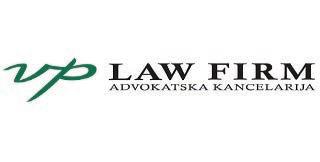
Teodora Drajzera 34, 11000 Beograd
Tel: +381 11 2642 257, E-mail: info@vp.rs Web: www.vp.rs Enrolment date: 2023

WEST PHARMACEUTICAL SERVICES
BEOGRAD D.O.O. Crvenka 76, 26220 Kovin, Tel: +381 13 2156 101 E-mail: kovin.office@westpharma.com Web: www.westpharma.com Enrolment date: 2020

WIENER STÄDTISCHE OSIGURANJE A.D.O. BEOGRAD
Trešnjinog cveta 1, 11070 Beograd
Tel: 0800 200 800; +381 11 220 9800
E-mail: office@wiener.co.rs, Web: www.wiener.co.rs
Enrolment date: 2003

YAZAKI SERBIA
Nova 7 bb, 15000 Sabac, Tel: +381 15 7195 241 E-mail: Ysd.Office@yazaki-europe.com
Web global: www.yazaki-europe.com
Enrolment date: 2022
YETTEL BANK A.D. BEOGRAD Omladinskih brigada 88, 11070 Beograd Korisnički servis: 063 9005 E-mail: officebanka@yettelbank.rs; banka@yettelbank.rs Web: www.yettelbank.rs, Enrolment date: 2015

YETTEL D.O.O. Omladinskih brigada 90 11073 Beograd Mob: +381 63 9000 Web: www.yettel.rs Enrolment date: 2006
